
 Mouth of the River Publication of Oyster River High School
Summer 2022
Mouth of the River Publication of Oyster River High School
Summer 2022


 Mouth of the River Publication of Oyster River High School
Summer 2022
Mouth of the River Publication of Oyster River High School
Summer 2022

Google/Microsoft pg. 6 Floating Teachers pg. 8

Dear Reader,
Eustace pg. 10
Senior Art pg. 12 Howland pg. 14
Grad Confessions pg. 16 Milliken pg. 18 Webb pg. 20 Ask MOR pg. 21
SATs pg. 22 Therapy pg. 24 Procrastination pg. 26 Compost pg. 28
We are beyond thrilled to be sharing our final issue for the 2021-2022 school year. We have had an amazing time as a staff creating new content for the community. While each MOR year presents its own challenges, we are so proud of the entire staff for persevering with a positive attitude. We have watched each staff member thrive and develop since the beginning of the year, both as writers and as leaders. Every writer has brought wonderful ideas and perspectives to the table which has helped create a unique magazine. We will certainly miss this delightful group of staff members.
This issue’s cover story, “Senior Traditions” written by Laura Slama, emphasizes some of the traditions at Oyster River, one of them being prom. Due to COVID, prom was a tradition that had to be modified, but this year, the excitement surrounding the event had led to the first ticket sell out in a decade.
The back cover portrays another tradition that was revived after COVID: the orchestra and band concerts. We are thrilled to see the Oyster River community’s excitement about these events.
Both the front and back cover photos were captured by Hannah Muessig. Be sure to check us out on Instagram and Facebook at @ mormagazine to stay in the loop, as we are constantly posting new content to our website. In addition to our print articles of Issue 4, we have also created entertaining podcasts including “College Advice,” “Design Thinking Seminar Class,” and “Weird Things You Should Know,” so be sure to scan the QR codes on our first page!


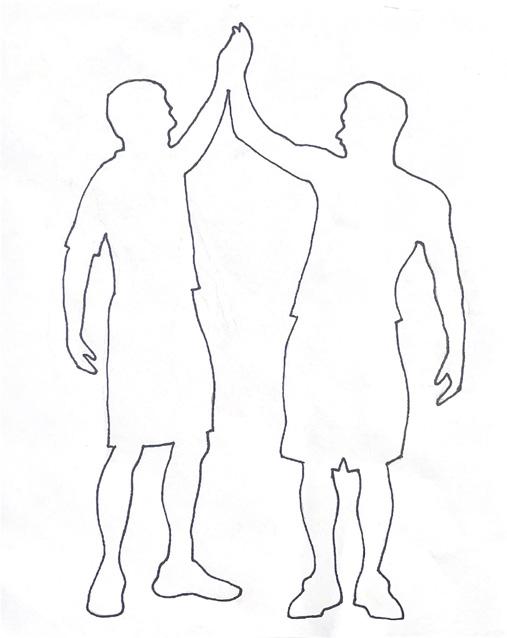
Lastly, we are always grateful for the support and generosity from our wonderful sponsors to help fund our publication. You can check them out at the back of the magazine, as well as on our website. If you are interested in sponsoring Mouth of the River for our following issues or would like to subscribe to the magazine, contact us at mouthoftherivermagazine@gmail.com.
On behalf of the entire staff, thank you for picking up our magazine and supporting us. It’s been a pleasure writing for you all and we hope you enjoy this final magazine. For those who are interested in writing for MOR - do it. We have loved every moment of this expe rience even including the slightly stressful deadlines. The leadership skills and meaningful connections you gain are worth everything. Peace out, Bhavana Muppala and Laura Slama, Co-Editors in Chief
Mouth of the River seeks to reliably inform the student body, as well as the surrounding community, of interesting and news worthy content in a modern, compelling format. Our goal as a staff is to give voice to the students of Oyster River, and have it heard by all our students. The opinions expressed in Mouth of the River represent those of the writers and staff.
MOR values respecting the gender identities of all people, and therefore uses the preferred pronouns of all interviewees. Some people use just one set of pronouns, such as he/him, and some people use multiple sets of pronouns, like using she/her alongside they/them. When discussing people with multiple sets of pro nouns, their pronouns will be used interchangeably. For more in formation about what this means and why it matters, please read NPR’s “A Guide To Gender Identity Terms’’ by Laurel Wamsley or visit mypronouns.org.
As exciting as it is to enter your last year of high school, there is the enormous aspect of applying to colleges for some students. To help them prepare in advance, Heather Clegg and I created this podcast with hopes that students would be able to gain in sight into the college application process. We didn’t have people to guide us through this process but it was a learning experience that tested many different strengths like time management, essay writing, and communication skills. Use the QR code below to lis ten to the full length podcast for our college advice or simply keep reading for the biggest pointers.
1) It is never too early to start. Through personal experience, we discovered that it truly is never too early to start the process. We found ourselves stressed out during the fall semester trying to keep up with deadlines in school but also writing the main essay and college supplementals. We learned that we should have start ed our common app essay way back at the beginning of summer. We highly recommend starting at the beginning of summer to ensure you will be on top of things your senior year.
2) Your essay matters. Upcoming juniors might be hearing lots of talk about essay workshops and peer editing opportuni ties. Take advantage of those. We cannot emphasize enough the importance of your essays because they are honestly what set you apart from other applicants who may share similar academic statistics as you. Your main essay is going to take time and you will not get it perfect on the first draft. However, do not be dis couraged. With the right attitude and utilizing your resources to complete many different drafts you will be on your way to the best common app essay to exist.
3) Enjoy your senior year! After all the college chaos set tles down by the end of first semester, it’s so important to reward yourself for the hard work you put in. The hours you spend writ ing supplements, crafting the perfect essay, and attending inter views requires a huge pat on the back. Take some time for your self to relax and try not to let the anxiety of college decision get to you. Everything will work out.
There were so many things I didn’t know, so I decided to do some research and make a podcast to learn more about them! Scan below to hear what I learned!



For many students, coming to school every day is monotonous and boring--they arrive in the morning, they do whatever work their teachers want them to do that day, they go home to do the homework their teachers have assigned, and then they return to school to do it all again the next day. There is little room in most curriculums to do anything other than what a teacher deems necessary without much student input. Jon Bromley, a science teacher at Oyster River High School, sees this pattern. Instead of participating in it, though, he offers an alternative in the new class he calls Design Thinking Seminar. I sat down with Brom ley and two seniors in the class, Dillon Labonte and Will John son, to hear more about Design Thinking Seminar and how it aims to let students guide their own learning. Scan the QR code to learn more about the class!
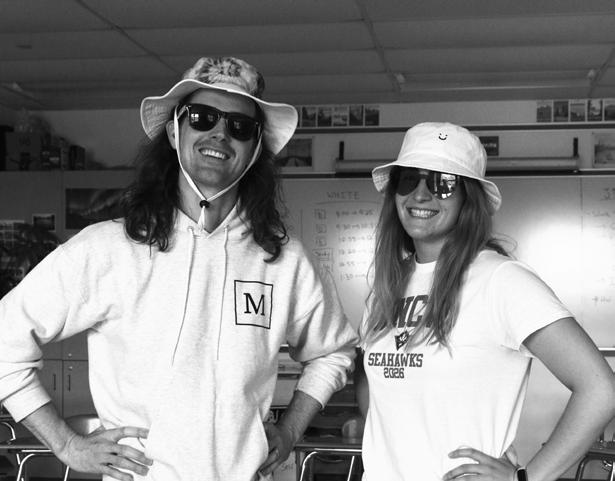
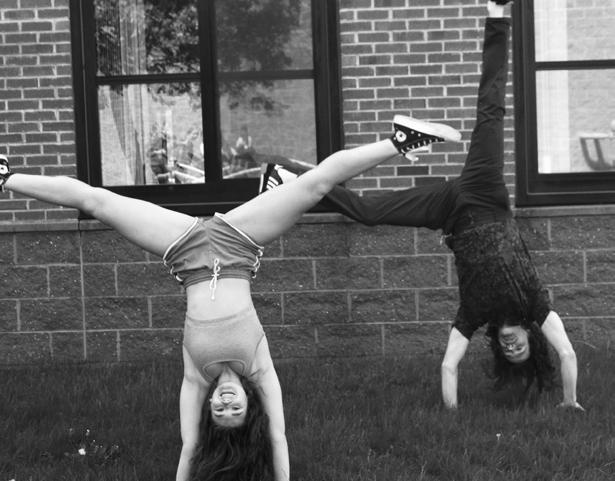
This issue, we asked our staff... What’s your favorite summer treat and why?
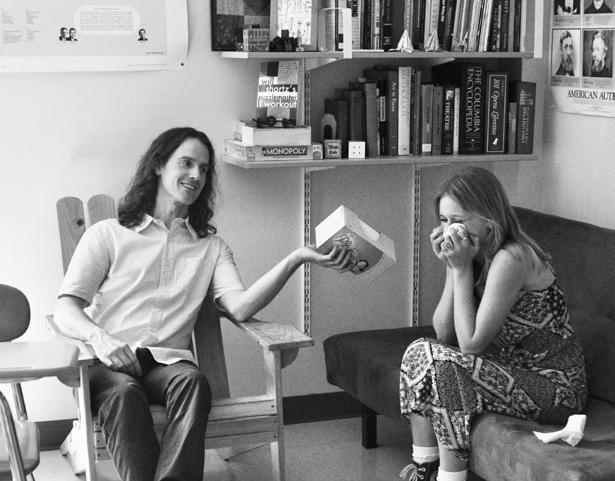 Laura Slama (‘22) Editor in Chief
Laura Slama (‘22) Editor in Chief
“My favorite summer treat is cookies and creme ice cream be cause it cools me off!”
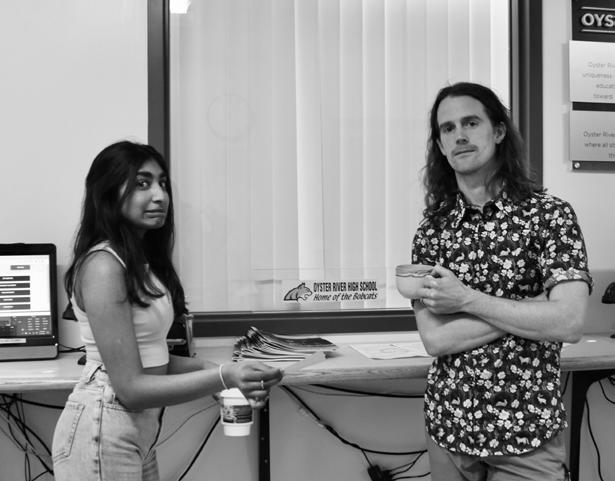 Bhavana Muppala (‘22) Editor in Chief
Bhavana Muppala (‘22) Editor in Chief
“I like caprese salad because it’s so summer and I just absolutely LOVE summer!”
Evy Ashburner (‘22) Business Manager
“My favorite summer treat is definitely black raspberry ice cream in a sugar cone- especially after a long beach day!”
Tess Brown (‘23) News Editor“My favorite summer treat is Bomb Pops! I love the fruity taste of popsicles, but Bomb Pops hold a place in my heart with the childhood memories they fill me with.”
Libby Davidson (‘23) Layout Editor“My favorite summer treat is watermelon. It’s super refreshing when it’s hot out and one of my favorite fruits!”
Caitrin Ferris (‘22) Marketing Manager“My favorite summer treat is mint chocolate chip ice cream. Mint chocolate chip is super refreshing and a summer treat I’ve been enjoying since I was little.”
Lauren Hoppler (‘22) Op-Ed Editor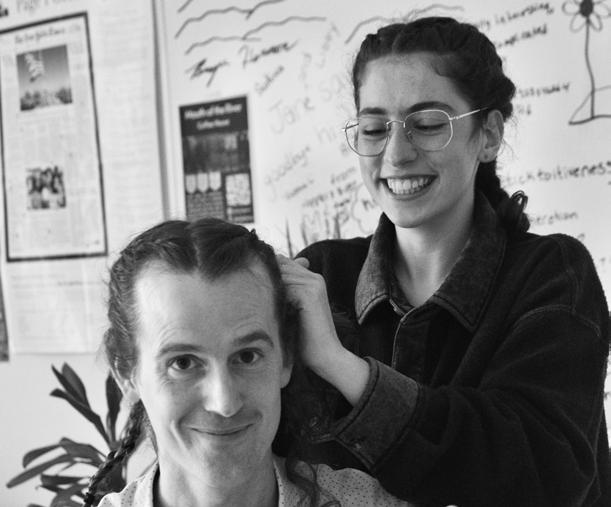

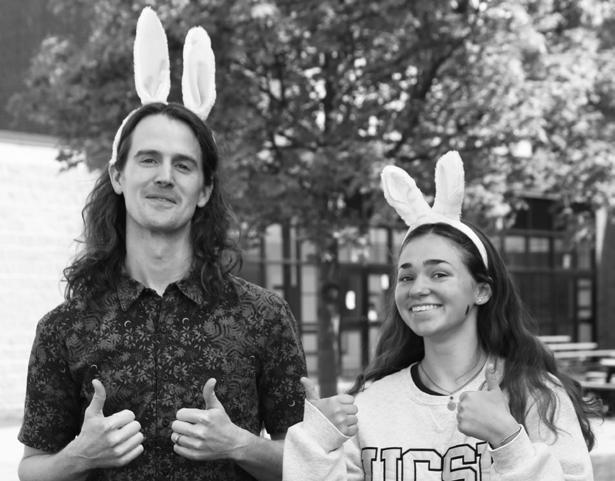
“My favorite summer treat is a steaming bowl of porridge. I absolutely love the added warmth especially when it’s 80 degrees and 90% humidity. My favorite thing to add is summer squash fresh from my garden!”
Emily Jackman (‘22) Digital Manager“I LOVE acai in the summer. I started getting it at The Spot in Durham and it is my favorite. It is so nice to cool down when it’s hot and their granola is the absolute best.”
“My favorite summer treat is ice cream! I like it because there is a large variety of flavors, which means I never get bored and it cools me down after a long summer day. I have so many great memories of savoring ice cream with my friends on summer nights.”
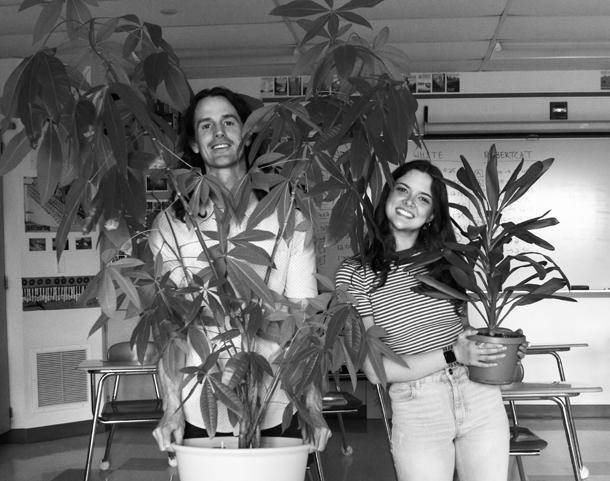 Jen Newick (‘22) Sports & Culture Editor
Jen Newick (‘22) Sports & Culture Editor
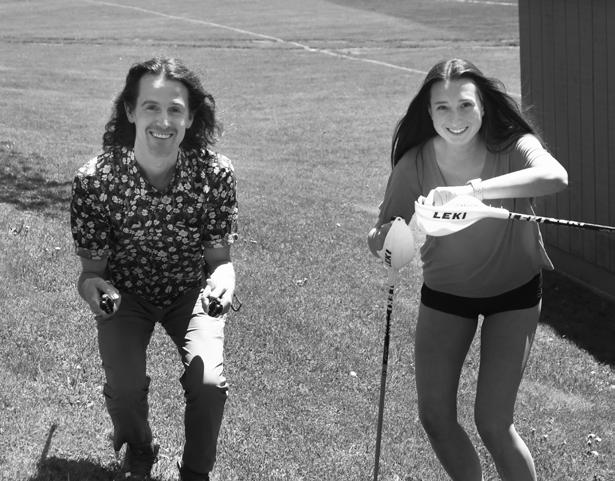

“I LOVE strawberries! They are by far my favorite treat in the summer. Chocolate covered strawberries, strawberry smoothies, yogurt and strawberries, and my all time favorite, strawberries with honey drizzled on top! “
Zoe Selig (‘23) Features Editor“My favorite food to eat in summer is cherries! It’s always so re freshing to sit outside in the sun with a big bowl of cherries.”
When the bell rings at 10:00am every Monday and Wednesday, Tess Pueschel (‘22) flips open her math notebook and starts to do the homework assigned for the next period. Meanwhile, Leo Doyle (‘25) shoots hoops in the gym with his friends and the school’s math teachers scramble to help all of the struggling students in the five classes they teach. With so many students doing so many different things in the building, are these 50 minutes of Flex time necessary and as useful as they can be?
With the 2021-2022 school year wrapping up, the Oyster Riv er High School (ORHS) administration is looking to improve the schedule in the interest of students and faculty, specifically for Flex time. Flex time at ORHS refers to the 50-minute block after advi sory on Blue days when students have the opportunity to seek aca demic support and social breaks based on their needs. As a flexible period in the day, Flex is often used by students to receive extra help, make up assessments, complete homework assignments, and take a break in the day. Both teachers and students try to use this designated support period in beneficial ways, but many have mixed feedback on the current model used for Flex at the high school. With issues with congestion in classrooms and students staying in their scheduled rooms, there is consideration of making Flex time longer or more frequent throughout the week.
Before considering changing the Flex period in high school, it’s important to understand how it’s currently used and why it’s im portant. Flex is used by students for numerous reasons and many say that these 50 minutes are helpful for managing their workload. Pueschel said that she uses Flex time to complete assignments or study, especially if she has a quiz in her remaining classes that day. As a part of her time management, she said, “the work that I do during Flex allows me to have more time at night to either do more homework or take a break after a long day.”
that he uses this block of time to grade tests and assessments when he’s not occupied with assisting students.
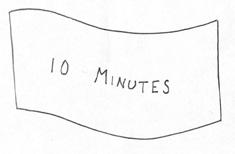







While some students like Pueschel use Flex as a time to get their homework done so that they can use their at-home time as a break,
This time is especially helpful for students who take higher-level classes that assign more and harder coursework. Julian Severance (‘22) makes a point that “a lot of other students who take more rigorous courses use it to do work… I think it really pushes those students to be able to take those more rigorous courses and moti vates them because they know they will have the time to do that.”
For teachers, Flex can also be a time for grading or a preparation period for their classes. Bill Reeves, an ORHS math teacher, said
others use this period for the opposite. Doyle uses his Flex time “to go to the gym and hang out with my friends.” Many students like Doyle spend their Flex time playing basketball or football in the gymnasium or playing chess or board games in the library. They see this time as an opportunity to socialize and decompress during the week.
Similarly, Severance spends his Flex time in his advisory social izing and listening to music to decompress. He appreciates Flex as a “built-in time for students to chill if they need it.” Individual stu dents work effectively in different environments, whether that be in the building or at home. Students may choose to relax during Flex time, knowing that they will be more focused and efficient when sitting at their kitchen table later in the day.
Mark Milliken, a member of the Scheduling Committee and Flex Committee, said he acknowledges that students use Flex time dif ferently based on their own needs. However, he also believes that “there is a time and place for blowing off steam and what [students] have to do is discern when that’s beneficial and needed versus [us ing it for] academic needs.”
As a substitute for “blowing off steam” in places like the gym and library, Milliken said that the committees have been working on rolling out enrichment activities for the fourth quarter of the 2021-2022 school year. “For the kids that don’t necessarily need academic help or to see their teachers, we are offering more enrich ment-type opportunities,” he said.
For those who do need the extra help to catch up on missed work or meet with teachers, Flex periods are an especially valuable re source for student-athletes at the high school. Pueschel, a two-sea son athlete, said that these periods are helpful for catching up on classes she missed to go to games, as well as finishing assignments that she doesn’t have time for after games. Typical of many athletes, Pueschel said that she often doesn’t get home from games until 7:30 or 8:00pm, which makes a built-in period to do homework during the day all the more valuable.
Athletes aren’t the only ones who use Flex as an opportunity to
“The work that I do during Flex allows me to have more time at night to either do more homework or take a break after a long day.”
“I do feel overwhelmed at times when I’m trying to help five people at the same time and they’re all doing different topics.”
meet with teachers. Students who need to get extra help to under stand a concept, make up a missed assessment, or communicate with their teachers for other reasons may choose to schedule them selves to their room to do so.
With students scheduling themselves in classrooms throughout
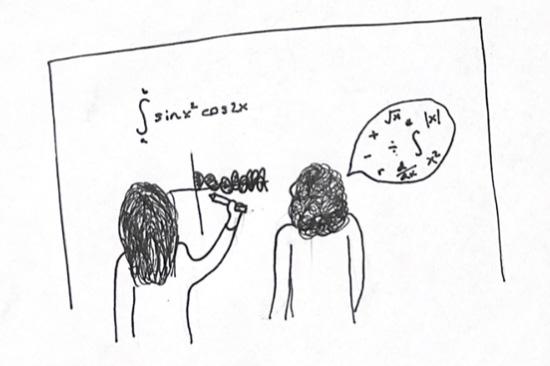
then I feel guilty that I’m pushing out other people that might need help.”
So, how can administration fix this congestion while still provid ing students the time they need to receive needed academic sup port from their teachers? Many students and teachers say that Flex
the building, Milliken said that there have been issues with kids going to the wrong room, wandering the halls, and hanging out in common places such as the senior core. As a matter of safety, secu rity, and supervision, Milliken stressed the importance of making sure administration knows where students are in the building. To troubleshoot this, the Flex Committee has tried implementing 10-minute Flex passes and having teachers not accept kids into classrooms they were not scheduled into.
In addition to some of the security problems that occur during Flex, another issue during these 50 minutes is the conges tion certain teachers face in their class rooms. This can make it difficult to help ev ery student with their individual needs. “We had a final yesterday, and I went in during Flex and there were so many people asking questions so it took forever for the teacher to respond,” said Lotta Berglund (‘25). Espe cially for teachers in the math and science departments, classrooms fill up quickly with students with individual needs.
This can feel overwhelming for the teachers who need to divide their attention in a way that addresses each student’s questions and needs. “I do feel overwhelmed at times when I’m trying to help five people at the same time and they’re all doing different topics,” said Reeves. His classroom is among the many that are often packed with students during Flex periods.

Reeves continued, “sometimes I’m caught off guard by who shows up and it’s hard to plan for that. When I anticipate it, I can plan ahead and say only certain classes are available this time, but
time should be increased—not necessarily lengthwise, but includ ed more frequently in the schedule. “I think we have the appropri ate amount of Flex time, but it would be nice to see Flex every day,” said Reeves. He also suggests, “I would like to see less advisory time and more Flex time.”








Pueschel shared the support of hav ing Flex time daily and dislikes the gap between the last Flex and the weekend. “I feel like I miss out [on Flex time] towards the end of the week. We have it on a Monday and a Wednesday, and at the end of the week I’m left hang ing until the next Monday,” she said.
Both teachers and students have experienced the 2019-2020 sched ule where Flex was
offered four times a week, the 2020-2021 remote-learning schedule where Flex was offered daily, and the current Monday-Wednesday Flex schedule. The Scheduling Committee is currently working to draft a model for the 2022-2023 school year that includes teacher and student feedback. It is expected to be finalized before the end of the current school year.
- Laura Slama
“I feel like I miss out [on Flex time] towards the end of the week. We have it on a Monday and a Wednesday, and at the end of the week I’m left hanging until the next Monday.”
Error 404. We are sorry, but you do not have access to Google. Pleasecontactyourorganizationadministratorforaccess.

This error message is common throughout the Oyster River Cooperative School District (ORCSD) when students try to access blocked Google sites such as YouTube and Gmail. However, with an impending district-wide switch to fully Microsoft programs, this message could become the reality for any Google sites.
For many students and even staff, the news of this transition was a surprise. According to administration, the switch has been in the works for more than three school years. The district began using Microsoft because of improved security and privacy over Google. Eliminating the use of Google will be a big ad justment for many, and students and staff have mixed opinions and ques tions about the coming change. Administration’s hope is that although Mi crosoft is a more complex system, it will be a benefi cial change for the mem bers of ORCSD.
While there have been plans in the works for a few years, there is no clear plan for how it will hap pen. The general idea is that at some point every one will need to move all files from Google Drive to their Microsoft OneDrive. Both administration and Oyster River High School (ORHS) principal, Rebec ca Noe, could not give a clear answer to when this will need to happen.
According to the Google website, “more than 140 million stu dents and faculty rely on Google Workspace for Education. Goo gle Workspace for Education can be used in compliance with FERPA, our commitment to which is included in our agreements.”
Director of IT at Oyster River, Joshua Olstad, said, “Google only recently, 2019 I think, started to offer paid addon services. [These] add security for their education products. We had transitioned to Microsoft 365 around 2017 because Microsoft had better security tools than what we had available.” He continued to explain that if the district decided to keep Google, they would be paying for ‘Google Workspace for Education.’ This would mean spending thousands of dollars to keep data secure.

He also mentioned that FERPA is not the only law which com panies need to sign. He said, “FERPA was written in 1974 for pa per documents, and it hasn’t adapted well.” The U.S. Department of Education explained FERPA as “a Federal law that protects the privacy of student education records. The law applies to all schools that receive funds under an applicable program of the U.S. De partment of Education.” There is new legislation related to student data privacy and security such as NH law RSA 189:66. To read (Who We Are > Deputy Commissioner’s Office > Office of Governance > NH
such as Google won’t sign privacy agreements. Mic signed
an agreement with Oyster River. Programs which are free, unlike Microsoft, usually make their money off of advertisements using your personal data. Morse said, “we don’t want to be the school system that inadvertently gives [student and staff data] to them.”
Although there is a new, more secure version of Google avail able, the district is still moving forward with Microsoft. Morse and Olstad feel that it would complicate issues further to keep Google and get rid of Microsoft especially with all the years of work that have been invested. Olstad said, “our entire system has been based on Microsoft products. To change that now would be challenging financially and [challenging] in the time it would take to make changes and train staff.”
The news of this change seemed to surprise many, but Noe ex
plained that this year teachers are supposed to be switching to us ing mostly Microsoft but there is still access to Google. Next year, Microsoft will remain the main program with no access to Google. Her interpretation of what is happening is that “over the summer teachers are supposed to take whatever is on Google drive and transfer it over, then next year we would start off and there would be no more Google drive.”
ORHS science teacher, Jon Bromley, has been using both Goo gle and Microsoft in his classes this year. He is concerned about rollout and hopes that he will be given preparation time to switch over. The reason he uses Google is because he feels that “[Google] was sort of revolutionary in how you could set up class activities and assignments. We talk so much about collaboration for students and what a wonderful place to do it.” Bromley described how One Drive is more complicated than Google. He also felt there was more of a learning curve to OneDrive, especially when it comes to shar more switching back and forth between soft wares. He said, “for me it’s about having consistency. I think it’s going to be better for students coming into the building and having that consistency because I know at the middle school they’ve been using mostly Microsoft.”
Morse echoed this statement and said, “[having] one standard creates a more efficient, cost effective and labor effective solution.” He also mentioned how there are seven technology repair staff to support over 2,500 users. Having one system will mean that those seven people will be experts and be able to help people more easily.
Most middle school students in Oyster River have been using Microsoft, however, students at the high school were all taught using Google. Ulysses Smith (‘25) is not looking forward to the transition and said, “I feel like the school shouldn’t force students


to use Microsoft instead of Google because for some students it’s more convenient to use Google.” He continued about how he’s experienced many issues with saving and sharing documents through OneDrive like Bromley.
Lexie Frangos (‘23) shared Smith’s opinion but was more neu tral on the overall switch. “Google has a lot of opportunities that [students] will need to understand in the future.” She felt that it was limiting to use just one software versus having the skills to use multiple.
The concern with having knowledge for the future was ad dressed by Olstad. He said, “in my opinion, I think knowing how to use Microsoft Office and Microsoft 365 benefits students. I don’t have the data but I feel like most colleges and universities use Mi crosoft 365.” Since many staff and students agreed that Microsoft has more of a learning curve than Google, being taught a more difficult system in high school could be useful in the future.

Olstad also ex plained how Mic rosoft is a stronger system. It has a lot of built in tools which Google doesn’t have. He gave an example of the comparison between Microsoft Word and Google Docs. “The core of a Google document is great, but I need Grammarly to start doing all my edits because the builtin [spell/grammar check] isn’t great. I don’t have a cita tion tool that I like so I need to add on a citation tool. By the end of the day, you’re adding all these extensions and all of them have to have access to your Google ac count.” Microsoft has better built-in technologies so extensions are not needed. Using extensions also brings back the issue of security. With Microsoft having every thing in one place, there are less issues with privacy and security
According to Morse, there is still a question of whether next year will be the full transition to only Microsoft. However, instruc tions from Celeste Best, Digital Learning Specialist at ORHS, have gone out to students on how to save all Google files to Microsoft Edge. Although things are not fully finalized, when you walk into the school next fall, be prepared for the likely chance of saying goodbye to Google.
- Libby DavidsonEvery morning, French teacher Heidi Sant frantically rushes to organize her traveling classroom, attempting to stuff all the materials for her french lessons into a tiny cart. At the sound of each bell, she staggers through crowded hallways towards her next class, wondering when she’ll finally get a classroom of her own.
Unfortunately, Sant is not the only teacher facing this chal lenge. Oyster River’s grow ing student body and lack of available space have left the school’s most recent ly hired teachers without classrooms. Instead, four “floating teachers” must migrate between rooms as signed to other teachers, often transporting an entire day’s lesson materials on a cart or within a bag. If in coming class sizes are larg er, the number of teachers sharing classrooms is only expected to escalate. While these teachers have tried to adapt to this unconvention al model, most view it as unsustainable, acknowledg ing that there are limitations to how they teach and the connections they can make with students.
“I would change profes sions if I had to do this for years,” says Sant, who was unaware she wouldn’t re ceive a classroom when she was hired in 2020. As someone who travels to a different destination almost every period, Sant spends a lot of time preparing her cart for the school day and is constantly scrambling from room to room, making it difficult for students to find her.
“I feel like it undermines my authority as a teacher because my kids don’t see me as a permanent fixture,” says Sant. “Part
of the joy of teaching is building that sense of community, and I feel like not having a classroom impacts how your students see you.”
Hazel Stasko, a sophomore in Sant’s French 3 class, recog nizes that Sant’s lessons are negatively impacted when students can’t reference posters on the wall, or are missing a document that Sant hasn’t brought with her. “I think students have less respect for her […] They don’t realize how challenging it must be to use a cart as a classroom,” says Stasko.
Science teacher Sara Cathey was also a floating teacher when she was hired eight years ago and, like Sant, remembers feeling iso lated from the students and staff who could never locate her.“Nobody could find me […] Now, I spend so much time in my room, and I have seven years of student art work posted; all of my equip ment is in here,” says Cathey, motioning to the student work and posters that adorn her walls and hang from her ceiling. “I have everything I need with me, and there is an absolute comfort and confidence that comes with being able to teach on the fly. When I didn’t have a class room, I was limited with what I could do and I could not teach spontaneously.”
On top of organization struggles and chaotic transitions be tween classes, it is difficult for floating teachers to plan creative and engaging activities. “There are limitations to what teach ers who have minimal time and materials in a classroom can do,” says Dr. Megan Thompson, a science teacher who rotates between five different classrooms.
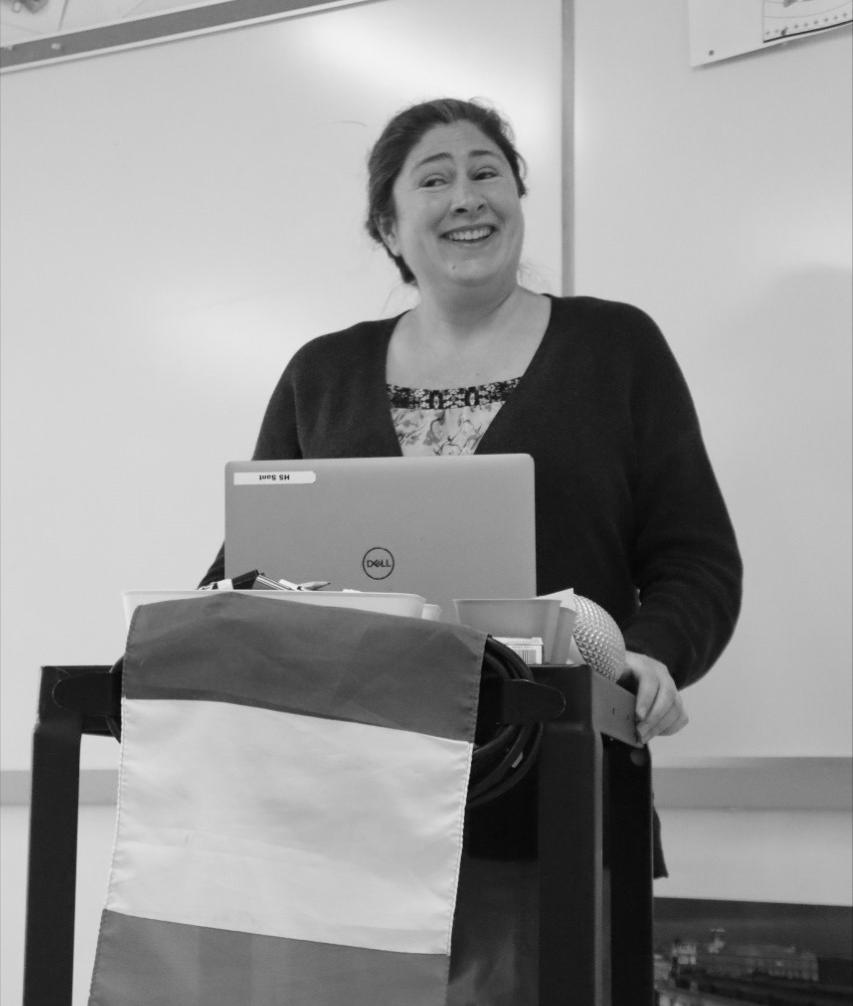
“I feel like it undermines my authority as a teacher because my kids don’t see me as a permanent fixture”Sant with her cart
Although Thompson wants to plan more engaging labs for her biology and NextGen students, she feels she never has enough preparation time as a floating teacher. “Sometimes you want to get there before students and get things set and ready, even if it’s just to write stuff on the board, but I can’t do that because I am running from another classroom.”
understands the difficulties of constantly moving and sharing rooms, but he believes that teachers should look at classrooms in a new light until a better solution is put in place. “It is a culture change to give up what you consider to be your own classroom. It is new for this building, and it is an adjustment, but we are trying to get teachers to view [classrooms] as more
Vivian Jablonski, a math teacher who taught without a class room her first year, sympathizes with Thompson. “All of the teachers I shared with would have been fine if I needed to move the tables for an activity, but it’s just peace of mind knowing that I could go to my classroom and make any given choice, not having to worry about making sure it lines up with everything”
Currently, the school is working to minimize the amount each floating teacher is traveling throughout the day, but some feel their schedules are still too hectic.
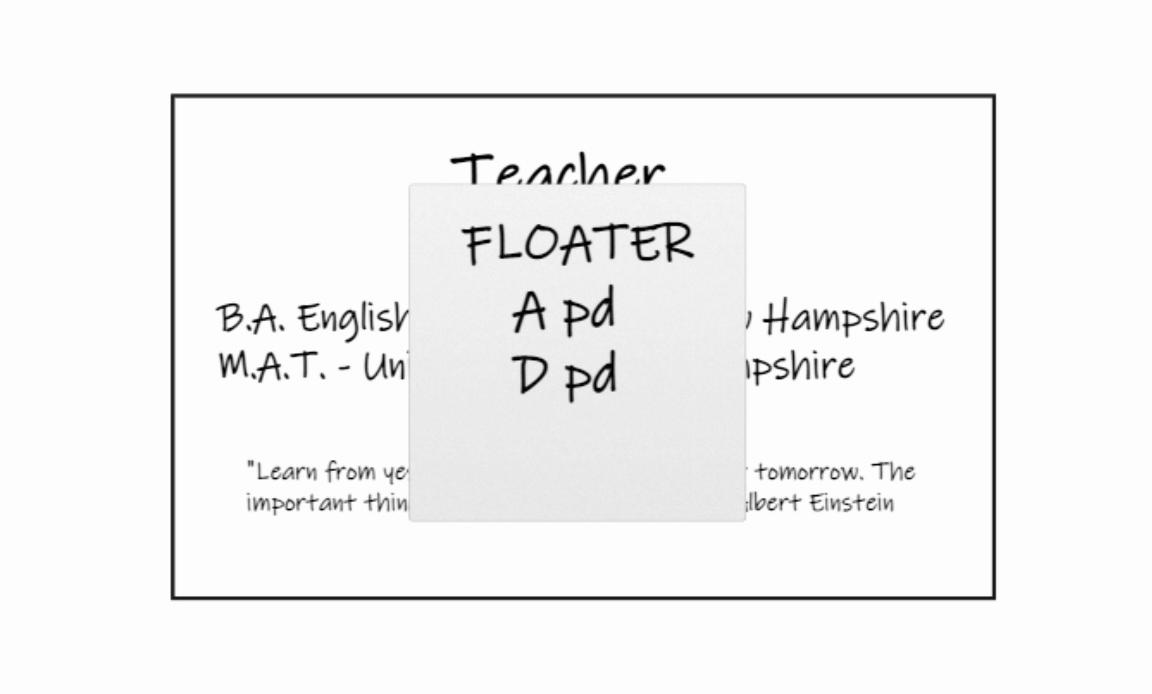

“It’s all about consistency,” says Cathey. “There is so much that goes on in a teacher’s day, and a lot of it is unexpected. That adds an element of stress and uncertainty that you can’t control. Your room is something you can control.”
As a former floating teacher, Dean of Staff Mark Milliken
of a shared space, and that is tough.” Sant thinks people should embrace the aspects that make a classroom personal to a teacher and the classes they teach, and that sharing classrooms takes away from this.
“Every teacher deserves their own classroom,” says Jablons ki. “It needs to be a priority.”
- Abby Owens (Guest Writer)“There are limitations to what teachers who have minimal time and materials in a classroom can do”
The soft vocals and lofi instrumentals of “Kenny” by Still Woozy play faintly from the small speakers of the Writing Cen ter. Alexander Eustace leans back to a ta ble behind a backdrop of hanging plants and a whiteboard covered in doodles of mushrooms. His sleeves are rolled up to his elbows while he looks over a student’s Shakespeare assignment. In perfect Shake pearian English he recites four lines on the screen and helps the student work through their question, but not before cracking one or two jokes about the “demonic entities haunting the lights” to his partner-incrime of the center, Jacob Baver.
To be honest, I don’t know much about Alexander Eustace - one of the newest ad ditions to the ORHS staff. In fact, I didn’t know anything about him at all before I walked into the Writing Center to inter view him. But I already have a feeling that what I’m seeing is the perfect picture of him: a young teacher who’s confident in his environment, who’s comfortable with his students, and who has a wry sense of humor indicative of his own time as a stu dent at ORHS.
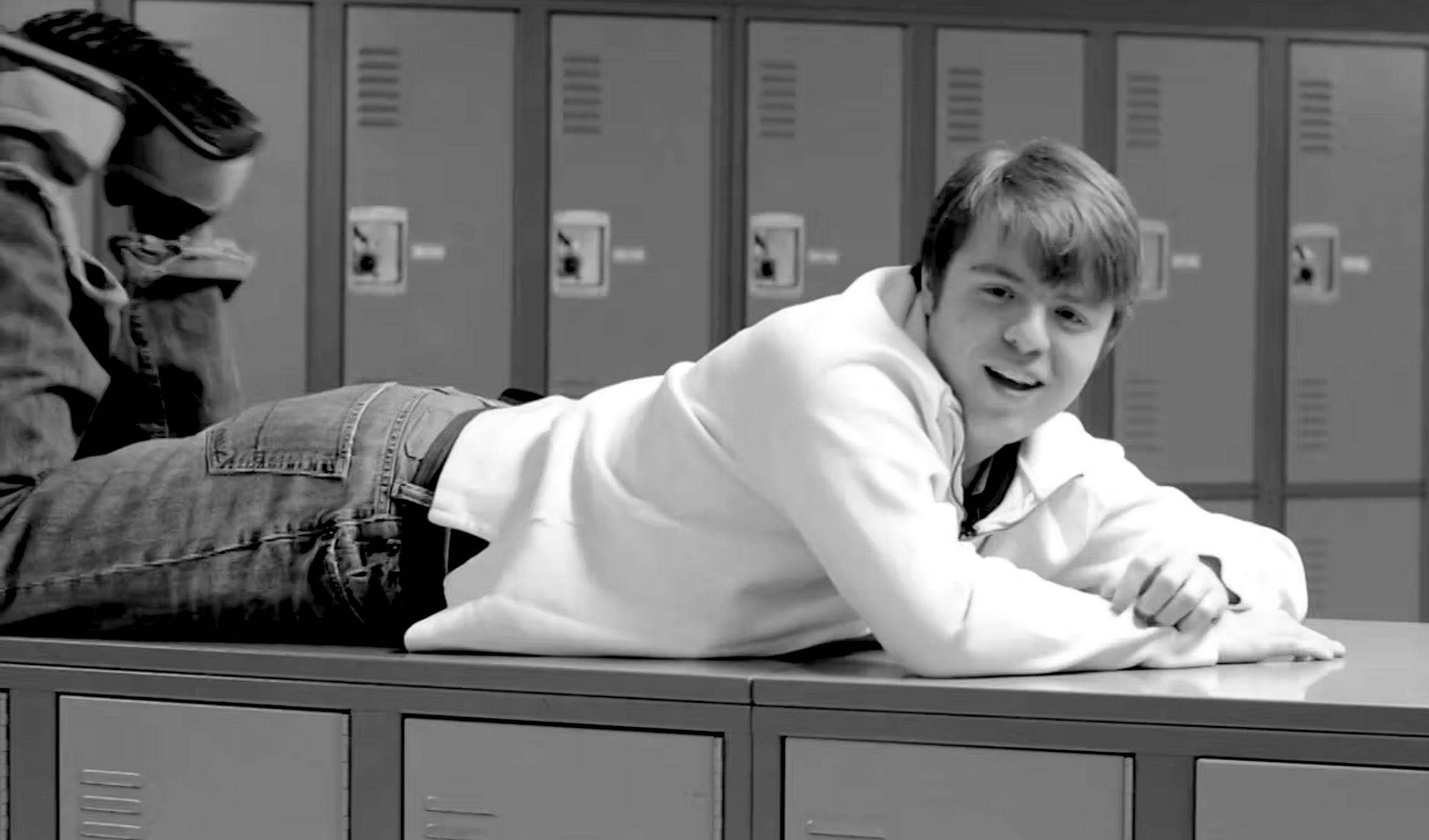
Alexander Eustace graduated from Oys ter River in 2014, long ago when the junior core still existed and when about half the number of students roamed the halls. He was, as he puts it, not the “best student,” spending more time making jokes than he would getting his work done. English Teacher Marjke Yatsevitch, who had Eu stace in her Poetry and Fiction class, de scribed him as a student who didn’t always take himself seriously but one who had the ability to maintain a “pleasant repartee” with herself and the other teachers.
I’ve quickly learned that finding the irony in a situation or engaging in any form of witty banter, as Yatsevitch suggests, is Eu stace’s strong suit. When I asked Eustace which teacher would be good to talk to so I could learn more about him, he leaned back in his chair and crossed his arms, seemingly taking a moment to consider the question, before saying, “Ms. Y. She will inevitably accuse me of doing bad things.”
As it turns out, that wasn’t completely untrue. Ms. Y recalls times when Eustace would purposely sit close to her desk to
bug her, or times when he threw tiny piec es of paper at her head when she wasn’t looking (although she didn’t know about that until years later).
Eustace wasn’t just a bit of a class clown, though. He was also none other than the host of ORTV. This was news to me when I found out, and I was definitely more ea ger than him to hash out the details.
“There’s a lot of footage of me out on the internet doing some incredibly embarrass ing things including jumping out of trash cans,” he told me with a bit of reluctance. He also said that a deep dive through the internet would be required to find these ancient archived ORTV episodes. Maybe that was to throw me off the scent or dis courage me from even looking at all, but unfortunatly for him it really only took one google search to find the videos fea turing Eustace.
I might encourage others to do the same google search if you’re looking for some entertainment. Each episode includes an intro showing him skipping through the halls with his fellow ORTV members, while the rest of the video is peppered with
cheeky comments or clips of Eustace lying on top of the lockers in the senior core, face in his hands, and legs kicking while he transitions viewers to the next segment. If you don’t want to go through all the effort of watching the episodes though, Eus tace’s ORTV bio pretty much sums up what he’s like: “Alex Eustace is pleased to be the host of ORTV. He attended Julliard (juvenile corrections facility) and has been recommended by nu merous experts to pursue something creative. His interests include collect ing candles, bird watching, and sing ing slave spirituals.”
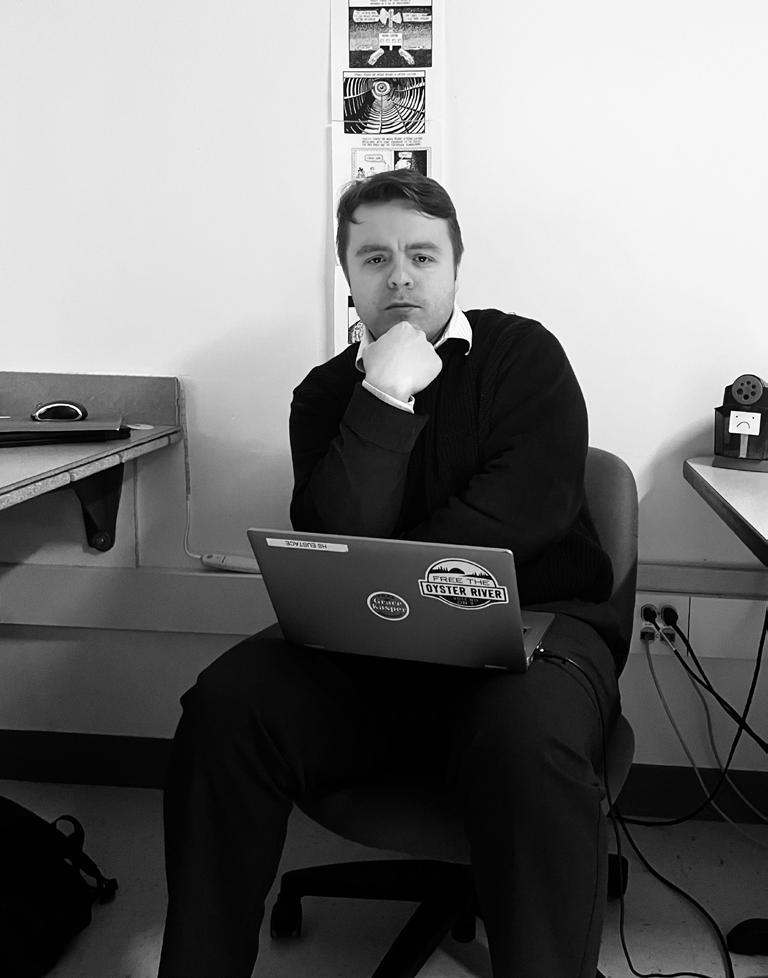
Flash forward to 2022, and Eus tace is back in the building to teach classes in the English and Theater de partments. As a fourth quarter senior just itching to walk across that stage at graduation and be on my merry way, I couldn’t help but wonder, why would anyone want to come back here for an extended period of time? Eustace explains that, “everyone kind of hates their high school and they’re like ‘oh, this place sucks or whatever,’ but then you realize, especially if you’re teaching in other schools, that it was actually pretty great and there is a lot you can learn from there.”
It does seem like Eustace is now making the most of his time here, especially as he works toward keeping the the ater program up and running. He was the theater director of the fall play Rumors and also helped the cast while they prepped for the spring produc tion of You’re a Good Man, Char lie Brown. Allison Howland (‘22), a student who starred in both the fall play and spring musical (and yet another person that Eustace said would probably say bad things about him), explains what it has been like to work with him: “Mr. Eustace is the embodiment of a theater kid. He defi nitely loves attention, and that’s definitely why he does a lot of things he does. It’s why
I do it, so I can’t blame him for that.”

What it truly means to live life as a the ater kid, I’m not entirely sure, but Eustace must be using it to his advantage. Howland explained how he is a lot more approach
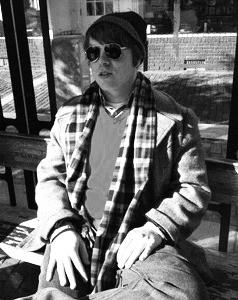
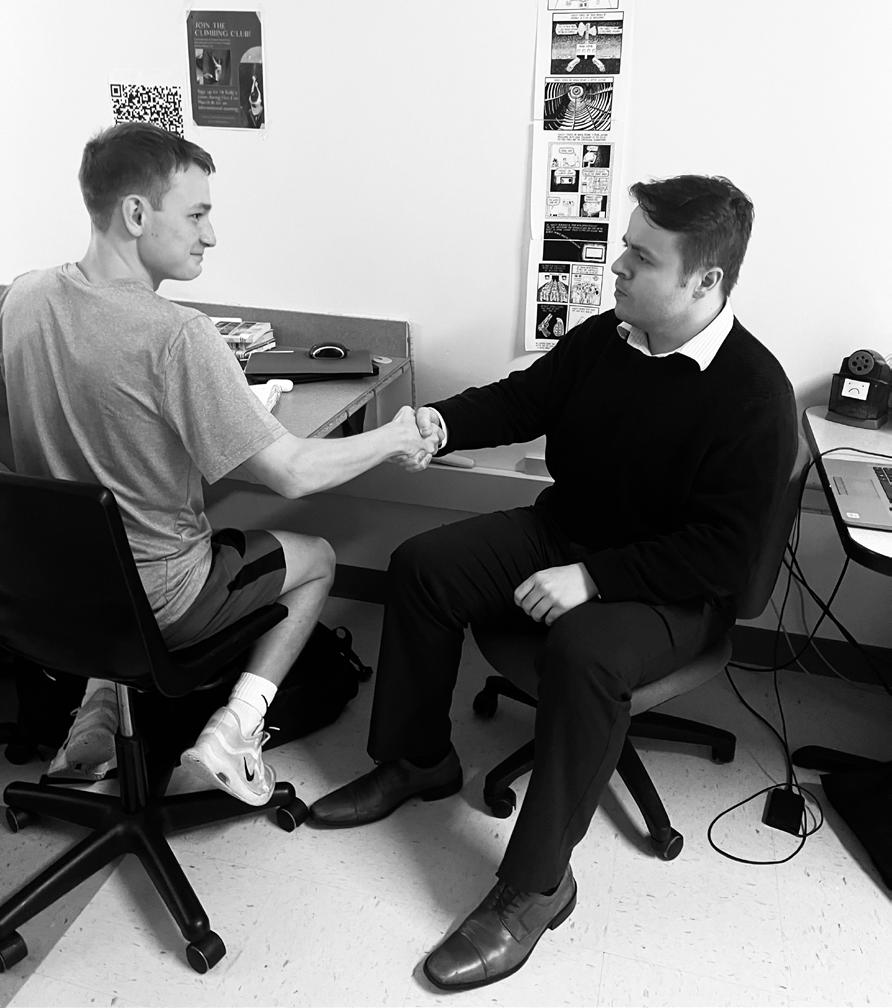
Aside from his approachable personali ty, the simple fact that Eustace can relate to students at Oyster River as a young teach er has increased his likeability. Brenden Barry (‘22) a student who has Eustace for Acting I and Expository Writing says that he, along with Mr. Baver, “are like a very strong middle ground be tween students and teachers because, although they are teachers, they still went here and can relate to us. They’re like friends and they’re like teachers, which I think is a great thing.”
This connection has helped Eu stace create classes focused on what students here actually value. That is, he knows that a lot of kids enjoy ac tivities that are student-led and class es more focused on effort rather than grades. “He lets students have their opinion and have a good time in class as long as they’re getting work done, because that’s what he cares about,” says Barry. He also notes that he isn’t super strict with assignments and his late policies “are a godsend.”
able than other teachers, and it’s likely why he was able to attract a larger crowd to the theater program this year compared to other years when fewer than ten people auditioned. Howland alsmentioned how his effort to create a nice set design and good costumes also went a long way with the cast.
As I’ve said, I’ve never actually had Eustace as a teacher, but watching him help studentst in the Writing Center, I can tell that he is able to make connections and get them to actually enjoy their time in the school.
It seems as if the Alexander Eustace who teaches at the school now is not much different than the Alexan der Eustace who was throwing pa pers at Ms. Y or hosting eccentric ORTV episodes eight years ago. He’s simply a bit older and a bit wiser. I guess this is good news to those of us who worry about our future or our life after high school. It is always help ful to know that even if you enjoy spending your time in trash cans or bird-watching, you can still land on your feet, and have teenagers enjoy your company.
- Lauren Hoppler
Oyster River is home to many talented artists. These people have worked for years to build their artistic skills and showcase them in different ways. These are their stories.

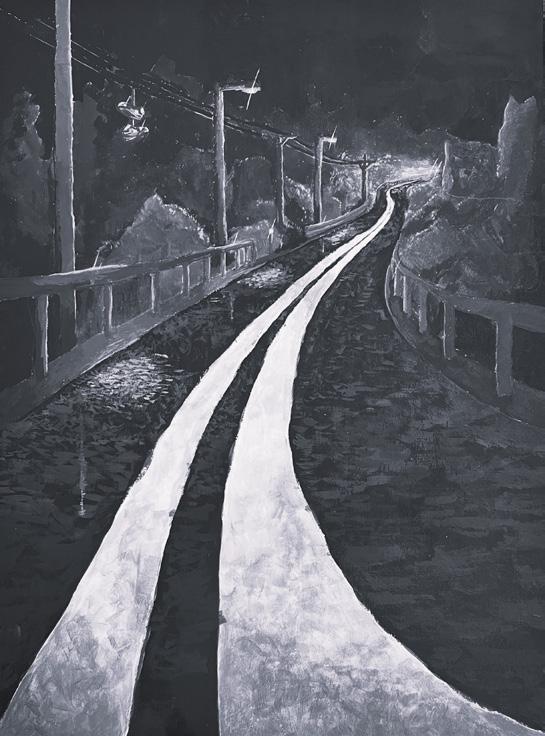

ital art, rather than just staying in draw ing, a comfort zone. There are many dif ferent aspects of art that Caruccio enjoys like the community, the relaxation of do ing art and “just that process of making mistakes and then learning from your mistakes in a safe space.”
Sofia Sarzosa has always been drawn to creativity, no pun in tended. Since elementary school, Sarzosa has been into discov ering different types of art media. It wasn’t until fifth grade that she found passion for photography at the Madbury Public Li brary. She was also influenced by her uncle, who is a professional photographer. For a long time, she was just teaching herself with her uncle’s photography gear. When the COVID-19 pandemic hit, she decided to buy her own camera, a Canon T Rebel 7. With that investment, Sarzosa has been able to get her work out there through yearbook club, as well as a personal photography Insta gram account (@sofshots) and website.
Sarzosa loves being a part of these things to bring back school spirit after remote learning and also to capture moments and memories. “My favorite type of photography is portrait photog raphy. I just love capturing people’s facial reactions and just like the naturalness captured.” Sarzosa would like to continue being a photographer next year at Marist College to continue improving upon this hobby while pursuing another one of her passions, fashion merchandising.
Website: sofiasarzosa.passgallery.com
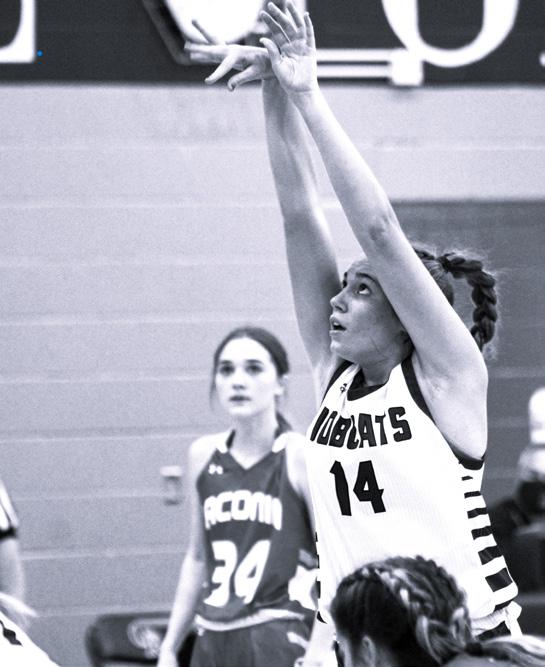
Instagram: @sofshots

Matteo Caruccio started doing art around age 3 when a variety of Crayola colors sparked his interest. Since then, he has been trying many different types of media. One summer, he did a program with his friends at an art stu dio where they tried coiling, leaf printing, painting and cutting paper. That inspired Caruccio to get out of his comfort zone and have fun trying to get better at things like painting, pottery and dig
Caruccio has gotten a lot more comfortable taking on chal lenges in and out of the art room because of the art classroom. He has shown his art at Mouth of the River’s Coffee House, as well as involving it when he was on stage competing for Mr. Bobcat. Next year, Matteo will be combining his artistic drawing skills and his logical thinking to work on becoming an architect at Virginia Tech. He wants to keep the fine arts as a hobby, but also thinks he’ll get a similar outlet out of architecture. Virginia Tech has an art space and studio for creating with unlimited sup plies, opening many opportunities to create for Caruccio.
Ella Daniels has loved art for a long time. In her freshman year, she decided to take it seriously and make it a career path. Daniels mostly enjoys drawing and painting, but recently has also really gotten into colored pencil, gouache paint and digital art. Daniels thinks art is important because it’s a different life skill that can offer different things to everyone. She also thinks it’s a good outlet for relaxation. “I think the art department is a very relaxing and safe place, and everyone can find value in that. Whether it’s sitting down and de-stressing after a hard class or learning a new skill, or just being a part of that environment, I think it is really important.”
Daniels has been proac tive about her art and show ing it in the Kittery Art As sociation and also teaching some art classes at Newmar ket School of Fine Art. As Daniels has developed as an
artist, she has put more meaning into her artwork. Many of her pieces express personal connections, such as experiences she has had, or bigger issues, such as phone overuse. Daniels talks about how we’ve seen art in many things for a long time and how it has expressed itself in things like storytelling, ads and architecture: “we’ve seen cave paintings, we’ve seen people taking what they don’t know and what they do and displaying that and an emotion al aspect, whether that be storytelling or your emotions, there’s value in that art.” Daniels has decided to continue making art next year at the School of the Art Institute of Chicago.
Instagram: @artistically.ella
Gaby Lowrey loves drawing, painting and pottery. Lowrey’s first art experience was with Crayola on her father’s apartment walls. Since then, she has been work ing with different mate rials to get out mental images on paper. “Art has always been like a type of thing that I can turn to when I’m having a hard time. It helps me get in the zone, work on my craft and is some thing that’s calming and makes me feel better. I guess for students here too, it’s all about inspiring others and being inspired.” One of the most inspiring times in art at Oyster River for Lowery was when she was a sophomore and she saw the senior art show. “I think, you know, the voiceover art showcases something really small that has a huge effect. Like being able to put student artwork out there and sharing it with your class I feel like it has an effect that inspires others and makes them want to create.”

Lowrey is unsure of what exactly she wants to pursue for a career, but she doesn’t think it will only be creating art. However, she would still like to stay in the art com munity in college, as well as making an art social media to let more people see her work. Overall, Lowrey thinks that art is becoming a more im portant thing in our society now. Robots are taking over many jobs and having art jobs will allow us to keep the touch of human emotion and story in our work.
Elise Riddell is an artist with bursts of random creativ ity and inspiration. She has played with pottery, painting, pastels, gouache paint and even started her own sewing ELO. In elementary school, Riddell was bullied and her 4th grade art teacher always made her feel better by giving her an outlet in art and mak ing her feel welcome in the classroom, even when it wasn’t class time. Since then, Riddell has really found a communi ty in art where she feels she is limitless in self expression for example in her self made clothes or random drawings.
Riddell likes how ORHS has art hanging all around the school’s walls. She says this makes the school feel more like an artistic community filled with excitement, rather than just a place where people move from classroom to classroom. She also believes this is true in everyday life, where people like to fill their space with things someone created that speak to them in some way. For this reason, Riddell loves filling her space in her room and in the com munity with art work. For example, she painted a mural in the ORHS library, made her own prom dress, and sells ceramics of mushrooms through social media.
Riddell describes her art dream, saying, “I want to own a pop up art shop where I have an app that follows me around the world and I would just pop up in random spots around the world with my little art shop and sell all the stuff that I made. I would give hints on the app so people could figure out where I am.” Riddell is aware that this exact art dream may not happen but is excited to attend Massachusetts College of Art and Design, where she believes that the professors and connections made there will help her pursue her dreams and make a career from her creations.



There is a large and diverse art community at Oyster River that has brought culture, creativity and comfort to our school. The seniors this year who have impacted the art community will be missed as they continue their creativity elsewhere. If you’re inter ested check out the social media of these artists.
 - Hannah Muessig
- Hannah Muessig
Have you ever looked at someone and wondered, “is that a man or a muppet?” Well, you’re not alone. Every morning Al lison Howland looks in the mirror and asks the same question. Her morning affirmation complete, she tromps into our hum ble former school board representative’s (Al Howland) closet to find her outfit for the day. On the bright and sunny monday that I spent with her, she chose a green Hawaiian shirt and styled it with her brown corduroy pants, brown Converse, and a pair of polka-dotted sunglasses stolen from a friend to complete the look.
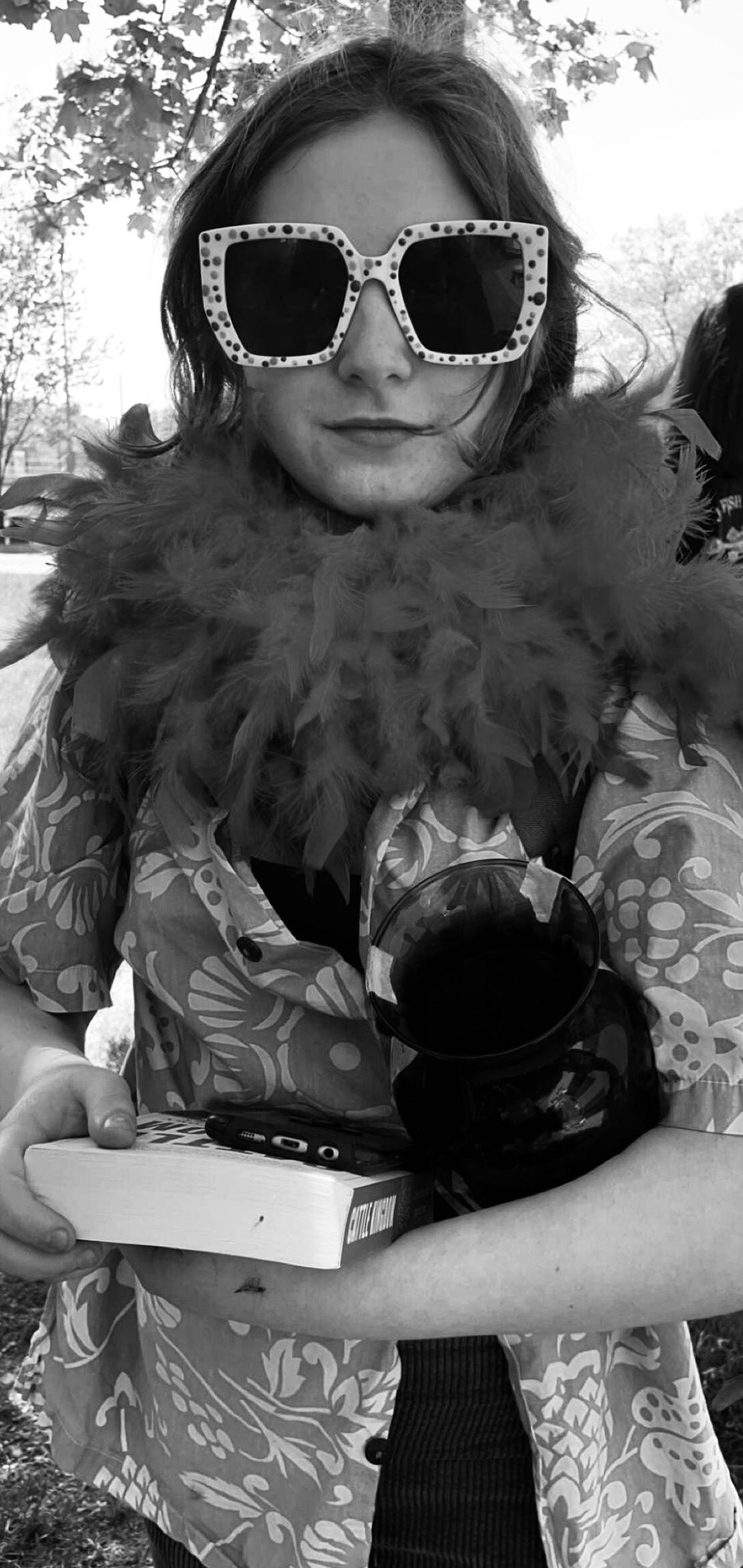
Ever since I interviewed Allison Howland for an article I wrote on Alexander Eustace, she has intrigued me. She has a confident demeanor, the most sarcastic sense of humor ever, and she’s con stantly calling out people for conforming to patriarchal ideals.
I got the vibe that Allison is a complex person, and not even close to an NPC (non-playable character) as she later suggests to me. But it’s impossible to know whether she truly is the person she presents her self as, especially when she says things like, “I’m 100% authentic in everything I do” in literally the most sarcastic way possible. So, who is the real Allison Howland? That is the question I set out to answer.
To do so, I decided to skip all of my classes and spend the entire school day with Allison to witness her behavior, observe her inter actions with peers, and simply chat about all things ranging from the Met Gala to her future career goals. Here’s how the day went:
I first walked into Allison Howland’s A period class, College Composition, at exactly 8:01 am. Given the amount of energy Al lison had, nobody would have guessed that it was 8:01 am. Don ning her planned outfit for the day, Allison chatted eagerly with her deskmate Sarah Boler. The rest of the class gave me confused looks but Allison ignored them, refusing to explain my presence. Instead she shushed them so we can hear the morning announce ments. When this week’s Bobcat of the Week was announced, she cupped her hands over her mouth and let out a loud cheer then slammed her hands onto the table with a smile on her face.
This was the first thing I learned about Allison: she is a big lover of Bobcat of the Week. Her dream all year was to gain the title herself, but when things were looking bleak, she had to put a plan into action by asking as many people as she could to nominate her: “I asked a bunch of freshmen, I asked Ms. Horsley, I asked Ms. Stetson, I asked Mr. Eustace, I asked Ms. VanDyke, I asked both the librarians, I asked Mr. Morin, I asked Sarah… ” she explains. Lo and behold, the next week, glowing praise for Allison echoed throughout the hall.
“Allison Howland should be recognized for her commitment to Oyster River. Not only is she a hardworking, high-achiev ing student, but she is also a devoted cast member and lead er in the spring musical,” Allison read to me from a screen shot of the compliment she conveniently saved on her phone. “I was the titular role,” she added, waving her finger in the air.
If you didn’t already know, Allison Howland is a massive theater kid, having starred in both the fall and spring productions. She’s so much of a theater kid that she even hopes to raise some theater kids of
her own one day. She explained, “I genuinely believe that every child should be a theater kid because you learn so many lessons. First les son? Rejection. Second lesson? Hanging out with annoying people.”
These are good lessons indeed, but it was honestly impossi ble to tell whether Allison was serious or not when she sat across from me, with her chin perched nicely on her hands, and with her sunglasses on even though we were inside the library. I do think she was being genuine though when she told me how she approaches acting and theater by saying, “I love trying hard, because I think yelling is fun and having energy is fun.”
After A period, Allison and I spent Flex together. Rath er than getting any work done though, she simply chatted about her aspirations to quit her part-time job at Hannaford. “In aisle nine, I’m gonna turn off all the lights so that when I walk down the aisle the freezer lights slowly turn on as I go,” she told me while she magically happened to acquire a bright pink feather boa that was now wrapped around her neck.
Since working at a grocery store doesn’t seem to be part of Al lison’s plans, I decided to ask her how she did see her future. As of now, she hopes to be a genetic engineer, a dermatologist, or a new er version of Nicolas Cage (National Treasure is her favorite mov ie). However, if all else fails, Allison simply wants to marry rich. Sounds like a foolproof plan to me, but Allison still has her doubts. She said she’s the type of person who is always looking to
while some of us might play this awkward moment off and over think it for a few hours, Allison knows her worth. “I just don’t both er memorizing. My life is a movie and those are the side characters.” Although my entire day was filled with various entertaining Allison moments, her interactions with Mr. Eustace were by far my favorite. When we entered the Writing Center, it was al most as if Allison was holding a mirror up to herself. These two are the exact same person, and I would pay good money to see Allison and Mr. Eustace host their own stand up comedy show.
During our conversation, Mr. Eustace not only engaged in some witty banter with Allison, but he also had some high praise for her. “I had actually never met a woman before Allison and therefore thought very little of them. I believe they were some kind of faetype creature that existed in the wild and lived under mushrooms and ate rocks and sticks.” Eustace continued, “after meeting Allison and seeing her pull out a Tupperware container full of ambrosia, the food of the gods, and drink a flask of nectar, I realized, oh, actually, they’re not simply mud-dwelling beasts as I had previously thought.” When I asked Eustace what he thought of Allison’s co medic abilities he simply said, “do I think Allison Howl land is funny? I think funny is Allison Howland. There have been a few funny men throughout history. Many many fun ny women. Allison Howland, I think, puts them all to bed.”
AP US History was our final class of the day and Allison was
ward the next thing, which means she’s never really satisfied with anything going on in her life. This leaves her a bit fearful of having regrets. “My biggest fear in life is waking up at the age of 45, realiz ing I’m in a loveless marriage, and I have three kids, then I’ll get a messy divorce. Imagine how awful that is? That’s what keeps me up.”
However, what does seem to satisfy Allison currently is work ing hard in her academics, which I came to learn during her C period AP Calculus class (one of the three APs she is taking this year). Her teacher, Bill Reeves explained that Allison works very hard in school to the point where she spreads herself a bit thin, but Allison claimed that this is simply because of how val idating it is to receive a good grade. “I would much rather cry at night over a grade than a guy,” Allison said. “Because like guys are temporary, but grades are forever. Powerschool is forever.”
Allison then spent the rest of class stressing out about her project. It was a bit reassuring to see Allison struggle to figure out the volume of a vase using calculus and plead to her class mates for help. It’s not that I enjoy seeing someone suffer, but it’s nice to know that she struggles sometimes just like the rest of us and that she isn’t 100% confident in everything she does.
Another thing that makes Allison seem a bit more human to me is that she gets people confused. “I’m really bad with people and like their faces and like knowing … Do you know Theo and Andres? I thought they were the same person until like a couple months ago,” Allison admitted. “I was like ‘oh are you coming to linguistics?’ and [he] was like ‘I don’t take linguistics.’” However,
surprisingly quiet while Ms. Van Dyke talked about the assign ment for class. Well, quiet until Van Dyke announced that we would be going outside for class, to which Allison responded, “WHAT?” with her eyes wide. This wasn’t a surprising reaction to me since earlier in the day I had learned that Allison loves being inside and wouldn’t even go glamping because it’s too gross for her.
As if out of protest, Allison spent the rest of class making fun of her classmate Ben Montgomery, telling stories from her child hood, and taking quizzes to find out which Founding Father she is (if you’re wondering, she’s Thomas Jefferson). Once the bell rang, Allison and I finally parted ways, and I watched as she walked away leaving a trail of bright pink feathers behind her.
I’m not going to lie, as much as I love spending the en tire day with Allison Howland, I was absolutely drained by the end of it. I was also a bit worried that I wouldn’t accurately de cipher what was complete truth or pure satire, or that Allison would accuse me of misquoting her in the name of the patriar
That being said, I do think I learned that Allison is a very genuine, kind, and funny person. She believes in not taking life too seriously, and it’s clear she lives her life by that philosophy.
But if you are still a bit unsure about who she really is af ter reading this, then I’ll just tell you that Allison How land is related to the one person who fell overboard on the Mayflower, and I think that’s all you really need to know.
 - Lauren Hoppler
- Lauren Hoppler
chy.
“There have been a few funny men throughout history. Many many funny women. Allison Howland, I think, puts them all to bed.”
High school was no musical, that’s for sure. Common scenes in my life over the past four years include late nights studying under only the light of my lamp, crying in the bathroom after failing a test, and being late for school because I spent too much time picking out an outfit. I was not at all prepared for freshman year, and I would do anything to go back in time and help out past and future me. But, just because high school was hard for me doesn’t mean it has to be hard for you. There are many things I did not know about high school as a freshman—heck, I’m still figuring it out at the end of my senior year! However, I can share how I made it through my four years and ended up committing to college.
Going into freshman year, I had no initiative to get my work done and get good grades. I thought that I had all the time in the world to make my grade point average (GPA) go up, but unfortunately, that was not the case. Once I got into my junior year, even with straight A’s and extra credit, my GPA would not budge. I didn’t care freshman year and I was more focused on my social life, which made my last year in high school very hard. There are a lot of things I wish I could go back and tell younger Emily. I would tell her to actually read the article she was assigned, to meet with her teachers when she needed help, and to study for the test instead of relying on her long term memory. Saying I made a lot of mistakes in high school is an understatement. However, I learned from these mistakes and it will help me going into my adult life. Underclassmen are living through these times when I made my mistakes so here is some advice from my older wiser self.

Like I said, I put a lot of my focus on my social life freshman year, wanting to make my circle of friends as big as possible. This did not benefit me in my academic life because I had no time or effort left over for my schoolwork. I didn’t join any clubs until my junior year be cause I always thought they were not important. I was completely wrong here: clubs benefit you and your social skills a ton. Joining clubs that interest you or relate to your future plans will not only show initiative to college or employers but will grow your knowledge as well. Clubs create environments to meet new people and make your circle bigger while participating in something you enjoy. It is also very important to sign up for clubs that excite you and are about things that you are passionate about. I was always interested in the women’s rights club because women’s rights are something I am extremely passionate about. Unfortunately, I let my anxiety get in the way and never signed up for the club because none of my friends were in it. This happened a lot during my early high school years, whether that be joining the swim team freshman year or joining the sustainability club. I regret allowing myself to limit the opportunities I gave myself. Not joining any clubs when I was younger made it hard to make up for the lost time when college applications came around.
Where I put too much focus on my social life and not enough on academics, other students had the opposite problem. Matteo Caruccio (‘22) was one of those students. “I think I could have invested more time into my social life instead of just focusing on my schoolwork,” said Caruccio. When in high school, balancing being a teenager with school can be hard. I found that dedicating at least one day a week to just time with friends and family benefited me with stress from my academic life. A lot of my peers like Caruccio only focused on their school work and didn’t allow time to do things they loved. I think forcing yourself to start new hobbies or invite a friend to the beach could help pry you away from your schoolwork. If you are in need of some hobby ideas, I started painting the landscape around me, working out, writing in a bullet journal, and starting a new book. Anything to get your mind away from that long Schoology to-do list will benefit you and your mental health.
It was also beneficial for me to find a core group of friends I could always lean on. When entering high school, you are put into a whole new pool of people and it’s important you find those who will benefit your life. I have stuck with the friends I made freshman year but I also made new friends along the way. Having friends who have similar values to you will help find that healthy social/school balance. A value that was important to me in my high school years was taking pride in my schoolwork. This made it so that my friends understood when I needed to stay home and do homework but we could also hang out often.
Around my sophomore year, I found a good balance between my social life and my academics. I found that planning times in ad vance with friends helped me schedule my schoolwork around my social plans. I also used the app TimeTree which is a shared calendar app with friends to find out when they had work, sports, clubs, etc. Planning is so important in high school, so if you want a healthy life and work balance, planning is your best friend.
When you enter high school, grades are the top topic of conversation. “What did you get on the quiz?” “What’s your grade in world cultures?” I don’t think I have gone a single day of my high school career without talking about my grades. Yes, grades are important and if you choose the path to college they will benefit you in the long run. However, grades should not be the focus of all of your life. Life in high school is different for everyone and for my first two years of high school I did not put much time into my grades. In middle school, it was not stressed how much grades matter even in your freshman year. All I was told was that high school would be harder, and it is. But I could have been so much more prepared for high school.
Like me, Jayson Blaisdell (‘22) would have changed the way his freshman year went. “I didn’t know how important grades were actually going to be for college. I just thought it was graduate [then] goodbye” said Blaisdell. Now that all the seniors are receiving their transcripts of all their years of high school, it can be hard to view your past grades. This is all the more reason to put in the hard work right from the kickstart. Blaisdell also went on to say “ my junior year, I really needed to compensate for what I didn’t do my freshman year.” I can not stress enough how much grades matter in all years of high school. Even if your plan is not to go to college, putting in effort all four years will help you once you graduate.
When it comes to clubs and sports, I was lacking during high school. As I stressed before, I let my anxiousness steer me away from joining clubs that stood for things I was passionate about. I think joining at least two clubs per school year will put you in a really nice spot for graduation. Picking out these clubs of choice is very important as well, because if you join the science club and you hate science… well, that would be boring. Joining clubs that do things you enjoy or are passionate about will make the time you spend there so much better.
Clubs are not the only thing you can do to better your experience during high school. I had a job all four years of high school and that gave me a lot of real-world experiences. I think a job allows you to show responsibility and manage your time wisely. Another thing I did during high school was find people in the community who worked in the area I was interested in. I am majoring in education next year so I used our Extended Learning Opportunity (ELO) program in high school to work with a local teacher in her classroom. This program was not something I learned about until my senior year and it would have been amazing to do internships earlier. Mr. Peschel in counseling runs this program so if you are interested email him!

High school is a different experience for everyone and maybe you take a completely different path than I did. In school, you have to know yourself and determine what works for you. This may not be what all of your peers are doing to make it through but that’s ok. The last thing I can stress to anyone coming into high school is to be yourself. Don’t let petty people ruin your happiness. Find your group, join those clubs you want to join, reach out for help, and stay true to yourself.
- Jackman
Jackman
Barb was in the quiet halls of the UNH library studying with her friend Susie as she decided to take a break at the sunny spots by the windows. As she was observing the herds of college students scrambling to get to their classes, she spotted him. Mark Milliken. The man she would eventually marry.
ORHS’ unofficial school mom and dad, Barbara and Mark Milliken have been married since 1986. To get more juicy details on how the two Millikens met, what their first date was like, and how they eventually got married, I sat down with them and asked them to walk me through their relationship.
Barb first knew of Mark back in her freshman year where he was in her English class and he would walk into class late everyday. She saw him around campus and shared a couple classes but it wasn’t until their senior year of college that they officially met. While neither of them could recall how exactly the two of them met, they remember distinct details of the beginning of their relationship.
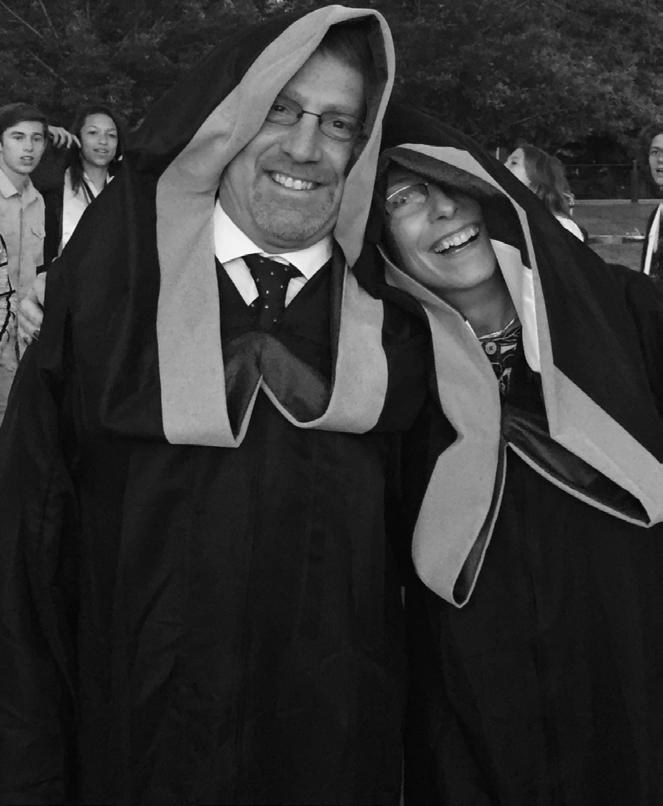
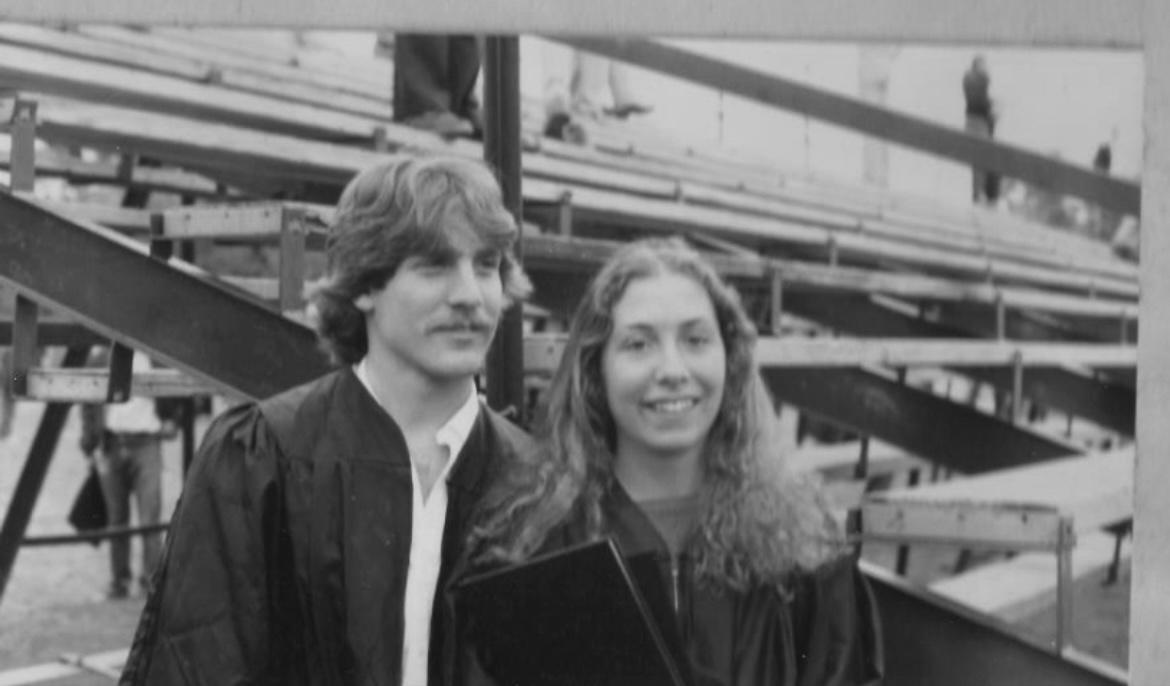
How did you guys first meet and what were your first impressions of each other?
Barb: I just remember seeing him but we met in the fall of our senior year [of college]…we [my friends and I] called him my little cutie. But I remember I used to find him [around campus]. I remember one time I was in the third floor of the library and I was taking a break and standing at a window with my friend and we saw him walking from Ham Smith and he was coming and he had on these red or pinkish Levis and he’s walking and I was like ‘Oh my god Susie! There he is, there he is!’ We ran downstairs and hid in a phone booth and when he walked by us we were like ‘Hi!’ So, there were a lot of “stalking moments” as he [Mark] would say, but I don’t think it was stalking.
Mark: It was stalking. But anyways, I don’t remember how it started. Like I don’t remember the English class.
Barb: Well you remember the English class…just I was not memorable is really what you are saying.
Mark: No I’m not, no I’m not. So I remember seeing you and liking you. And when I was at a Halloween party and I was just trying to get the courage to say hi and she took off in a tandem [bike].
Barb: No! You are getting it all wrong!
Mark: And then I found out she went to see this guy.
Barb: No! Here is the story!
Mark: His name was Duck.
Barb: His real name was Donald but his nickname was Duck which is even worse. But, he [Mark]came up to me and we talked at the party and then someone showed up with a tan dem-
Mark: Oh! So, I did get the courage to talk to you.
Barb: Yeah, we talked! So then my roommate and I took off on the tandem to go to the Stone Church.
Mark: To see Duck.
Barb: Yes. But the tandem we rode made me sick. We were riding it so fast I got sick. So, I went home and went to bed.
Mark: Right…
While both Barb and Mark had different versions of how they first knew of each other, the first time they actually had a real conver sation was through their mutual friend, Marriane, who would eventually become both of their sister-in-laws. After weeks and weeks of communicating through rumors of who liked who, Barb and Mark eventually went on their first date.
Barb: We found out that there was a mutual interest and that went on for some time.
Mark: It’s like middle school, “Oh I heard this, oh I heard someone likes you.”

Barb: So we both knew that this was happening…I was leaving a Peace Corp meeting to go to a class and there he was walking out of the library with his journal in his hand. So, we talked and that was when he asked if I wanted to go downtown to get a beer and it was the first class I had skipped in my entire life.
Mark: See what a positive influence I am!
Barb: Even better! He had no money! I had to pay! But that was our first date and we were together every day after that. And so the next day he showed up and I was studying in the library and he wanted to know if I wanted to have a beer and guess what he didn’t have again? Money! So, he had to go into the restaurant next door to borrow money from our now sister-in-law…so why did I not realize he was a red flag!
From then, Barb and Mark’s relationship bloomed and they were with each other from there on out while still taking their relationship slowly. Fast forward about three years, Mark proposed to Barb while on a trip up in Maine.
Mark: My mom owns a cabin on a lake so my plan was that Barb and I would sleep at the cabin or the camp which is what we called it.
Barb: In two different beds!
Mark: Of course. Yes. Right. That’s right. I forgot about that part….I was going to wake up at sun rise because the sunrise is right over the lake. I had written a poem but in the middle of the night, my younger brother broke into the camp. He had been celebrating…shall we say, and he broke into the camp. Well, ‘broke in’ but he lifted a window and crawled in. And he had someone with him who turned out to be our sister-in-law!
Barb: The same one that gave us the money!
Mark: So, that ruined my plans for that morning and I didn’t know what to do. I grew up in a house on a hill called Deer Hill and behind our house is a hill and you can go to the top and there is a rock you can sit on and look out. So, that was plan B and we went up there and sat on the rock and I got out my journal and read my proposal. And then she said yes!
About a year later, Mark and Barb got married on July 12th, 1986 at a church and their recep tion took place at the base of . The wedding took lots of planning so the wedding day itself was a day for them to relax and enjoy their time together. While the two of them still had the wedding day nerves, they were able to get past them and have a wonderful time. Mark explained that the highlight of the night was when his friend brought his old car that had a rumble seat in the back and both Mark and Barb were able to ride it. The events following their wedding were just as exciting as they were able to spend some time at the same place Mark initially proposed.
What was your wedding like?
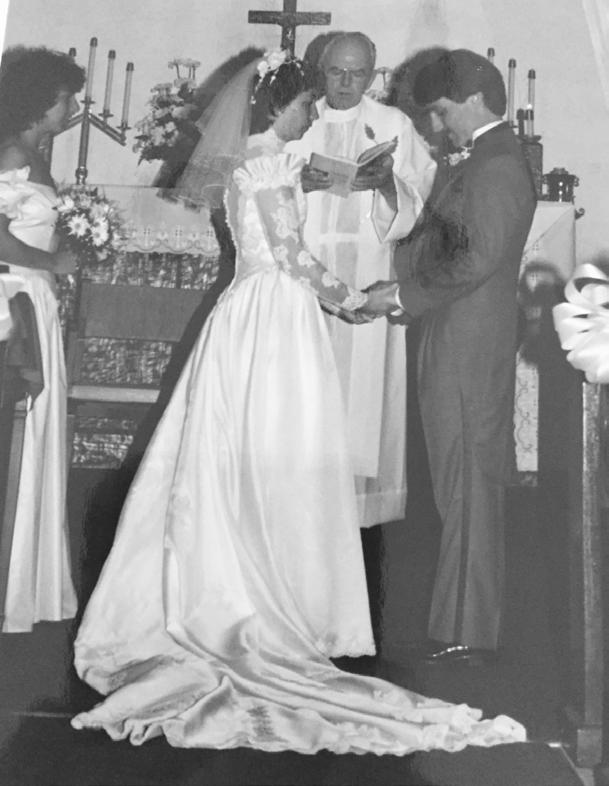
Mark: I grew up in the sticks so my groomsmen were-
Barb: He had a groomsmen who wore a yellow construction hat!
Mark: Actually it was stainless steel. But there was a real culture clash [at the wedding]. I think Madam was also really worried about the behavior of my friends.
Barb: Oh, I was really worried about the behavior of his friends.
Mark: But I think we all ended up having a really great time!
Sitting down with the Millikens gave me a good laugh and I can officially say they are truly the school mom and dad.
- Bhavana MuppalaAs the staff and students of Oyster River High School (ORHS) returned to being fully in-person this school year, a new face was among them. Smiling at people in the hallways, poking his head into classrooms, and creating a culture of patience and kindness in the school has been John Webb, the new Director of Counseling at ORHS.
Webb arrived as a staff member to the district at the beginning of this school year after working as a school counselor at Goffstown High School for 21 years. Now as the Director of Counseling, Webb is responsible for overseeing the counseling department and mak ing sure that all students receive the academic, social, and emotion al supports they need. Even though this is his first year working at ORHS, Webb is not new to the district—he was a student here himself in the 1980s and raised three children who went through the district as well. Webb’s personality and interactions are guided by the principles of patience, kindness, and care for all stu dents.
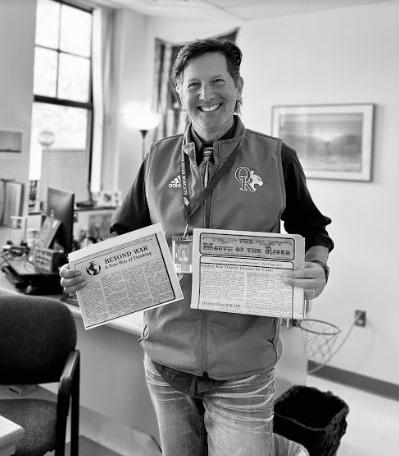
When I sat down with Webb for an interview, these personality traits were obvious to me as soon as I walked into his office. His walls were covered in affirming post ers and art by his children, and his desk held fidget toys and smooth rocks painted by his wife. He told me he decorated it like this because “what I’d like to do for any student that walks into my office is to show them that this is a comfortable place, a safe place, a place where you can grab a fidget or test your stress.”
He added, “if you really want to know me, everything in this of fice has a meaning or a purpose. If you looked around and you said, ‘John Webb, what does this mean,’ I would tell you. There would be at least a 15 second story with almost everything that you see.” I noticed a Bennington flag hanging behind his desk and asked him about it, and he held true to his word. It had hung in his father’s office for 42 years, and when he retired, Webb asked for it and hung it in his office.
Webb’s father’s influence on him is present in more than just his office decorations. His mother was a psychotherapist and his father was a professor of school counseling, and Webb says his par ents have always been his biggest role models. For example, “in a world where masculinity… was mostly tough guys, [my dad] was the kind of guy that when a neighbor was upset because my brother was driving too fast in the neighborhood and said… ‘I got a bone to pick with you,’ my dad would say, ‘pick away.’ He wouldn’t take of fense at it. He would just say, ‘let me hear what your concerns are.’”
Because of both who he is and how he was raised, Webb said
his talent for counseling comes naturally to him, as kindness and compassion were taught to him from an early age. In Webb’s own words, “I’m the most patient person I know.”
Another valuable asset of Webb’s is the fact that he is a former student and parent of the high school. Webb has found that his knowledge of the school culture and history has helped him form connections as an employee here. As a student, he played on the basketball team, was on the staff of Mouth of the River, and was taught by several legends of Oyster River who he stayed in contact with after graduating. Webb said this background helped him be cause other faculty could see that “oh, you’re one of us, you know the Oyster River way.”
Webb says that returning to work at the district in which he grew up has been a “homecoming. I felt very welcomed.

I felt very comfortable.” He has also rekindled and found many connections at Oyster River, from his students’ former teachers to his own former classmates and now colleagues.
He has played music and sang with Mike McCann and Mary Beaton on several occasions, as well as bond ing with Dave Hawley, Shawn Kel ly, and Scott McGrath over their shared interests in trail running. In just a few months of poking his head into classrooms, lead ing professional development trainings, and starting up con versations, Webb has created strong bonds with many of the faculty members of ORHS.
But, even though Webb has enjoyed his time at Oyster River, he will not be coming back next year, instead returning to his job as a school counselor at Goffstown High School that he held for 21 years before coming here. “I miss counseling so much, I’m going back to it… I’m kind of bittersweet about that.” Webb continued, “I got a call from my former principal a month ago, and decided that ‘life is too short not to be doing what I love,’ which for the past 23 years, prior to this one, was what I did [as a school counselor].”
“My homecoming was shorter than I hoped, but I’ve had a great ride and I’ve greatly enjoyed my time with the people here,” said Webb. Looking to the future of Oyster River’s counseling depart ment, Webb said, “I would continue to want this department to be the most welcoming place for students, that students of all shapes and sizes and feelings and issues in their life all feel comfortable coming down and getting help.”
It is clear that Oyster River will be losing a wonderful member of our community as Webb returns to Goffstown, but Webb’s legacy of patience and kindness for all students will live on in the counseling department and beyond.
- Zoe SeligI feel like my relationship may not be working out, what do I do?
Alright people, I know right now your high school relationship may feel and seem magical, and it probably is, but chances are it won’t last forever. While everybody would like to believe they’re in the one relationship in a million that will work out, this is probably not the case. However, this does not mean to just give up. Most of the time, after a relationship gets out of the honeymoon phase, it gets harder. The feeling of the beginning of the relationship has faded and you feel that nothing can go wrong, then it does. School gets in the way, you start to maybe notice the flaws in both of you, it just gets harder. This doesn’t just mean you should give up though. The reason you guys started dating in the first place was because of who each of you were. Even if the relationship feels like it’s losing its flare, find ways to bring that back. Do things you haven’t done before, visit a place you’ve al ways wanted to, just in general find new ways to fall for each other all over again. An important piece of this, though, is recognizing the signs of a toxic relationship. Sometimes when in a toxic relationship, things seem perfect at first and then take a turn for the worse when true colors are shown, trust me. And if you don’t want to take my word for it, read Hannah Muessig’s article “Glamorized Toxicity or Happily Ever After” to read more about the difference between a healthy and unhealthy relationship. Remember too, it’s okay for the relationship to end and it’s okay to be sad too if it does. Relationships are a different level of trust and connection and as we get older, anyone who wants to will experience a lot of different relationships. It takes trial and error to find what works for you and even if that’s not with your current partner, then that’s okay.
How do I stay more focused during my classes?


Take it from me when I say that focusing in class is not one of my strong suits. The smallest things can easily distract me and take my mind off the lesson. I think a lot of this is because of the technology burnout many kids feel after almost two years of online learning. I know I certainly can get distracted when doing assignments on a com puter and will find myself feeling bored. One way I have improved my focus is by taking handwritten notes. I find when I handwrite assign ments or notes, I feel like not only am I comprehending a lesson more, but also, it’s forcing me to stay focused because I’ll know that these are notes I’ll need for later and keeping them nice will also help me more. Another way to stay more focused is to find something good to listen to when doing work. I love background noise and need it in all aspects of my life, especially when doing school work. I used to listen to mu sic but found myself getting bored of the songs or changing them a lot. This is when I then discovered podcasts. Podcasts are a great tool because you feel as if you have someone talking to you. I love horror ones, especially from Disturbed and Lights Out, which tells almost 3 hours of different stories so I’m not stuck listening to the same thing over and over again. It’s about finding what works for you and building off that to improve your focus in areas all around.

How do your classes influence who you’re friends with?
I think it can go either way. If you are someone who is more introverted, definitely being with a friend in your class and having that familiar face to look at can be amazing and make you feel super comfortable. However, there’s always the dread ed time when the teacher tells you to work with someone you haven’t before, or worse…picks the partner for you. While it can be scary to no longer be able to work with a friend who knows you well, sometimes it can be beneficial too. Working with someone outside your comfort zone can help you meet new people in your classes. I think this can be beneficial too because if it’s an elective course, then you’re meeting someone who may have a similar interest to you that you can relate with. This can help influence who you’re friends with, and does not mean that they will have to be your best friend, but it can give you school friends. School friends may not be your best friends and maybe you only hang out every once and a while, but they’re someone you can relate to in class and get to know better as time goes on.
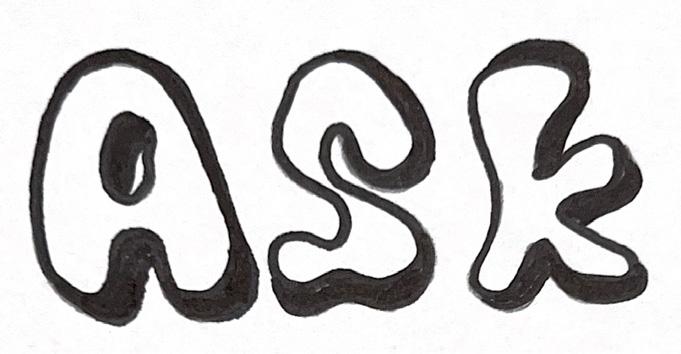
What clubs have been most fun for you in high school?
I have found a lot of clubs that piqued my interest in high school. During the 2019-2020 year, I joined Model UN and absolutely loved it. In Model UN, you acted as a country and worked with other countries to solve real world conflicts that were being discussed in the United Nations. I thought it was so fun because you interacted with so many people and got to work together to come to good solutions that work for all. However, I think after COVID and because of minimal inter est, the club is no longer running. During the 2020-2021 year, I didn’t do any clubs because we weren’t in school. However, this was the year that I joined Unified Soccer. While this isn’t a club but rather an actual sport, it was such a wonderful ex perience. It was so good to watch everyone on the team grow and become better players. We made it to the championship that year and came in second place. However, this did not de ter us from becoming the champions this past season. I also played Unified Volleyball which was just as inclusive and also went home with a championship last season. One club that I did not expect to join was the Red Cross Club, but then I did and I absolutely love it. This club helps with blood drives, runs fundraisers, and does so many fun things. Joining clubs is so important in high school. Not only does it look great on col lege applications, but it also gives you those extra connections with people you may not expect to have them with. Whether you’re not sure where to start with joining clubs or if you’re already a member of several, make sure to go to the club fair at the beginning of next year. This will give you so many dif ferent clubs that you can check out to make sure you find the one that you’ll be able to connect with.
Hands shaking, palms sweating, heart racing. All for the SATs. But wait, are those even required anymore?
Over the past few years, colleges have begun to be test optional when it comes to submitting SAT/ACT scores. While most colleges made this switch due to the COVID-19 pandemic, some colleges have not been requiring them for even longer. Bowdoin, in 1969, became the first college to be test optional. They focus insteadon the academic achievements and interest ex tracurricular students have to bring to the school. As the Class of 2023 has started to get their school-administered SAT scores back, it made me wonder, how much will it affect me to not have my score present on my applications?
Because of the dropping of SAT/ACT requirements, this has prompted many juniors to opt not to take them. Madelyn Marthouse (‘23) has had the experience of being surrounded by her mother and stepmom, who both work in higher education at Southern New Hampshire University. Because of this, Marthouse has been able to have an inside look on the process on how the SATs can aid in the application process and how they can not.
For Marthouse, a big part of not tak ing the SATs was the stress taking the SATs would bring. “After I took the PSATs, I was absurdly upset and [my mom] was telling me that not a lot of colleges look at the SAT scores anymore. She then said I could use that to prioritize my mental health over taking a three hour long test.”
This can be the case for others, as well. Differing from Marthouse, I did take the SATs in late March. I had gone through an entire prep course and been conditioned on what to expect. Taking the test for almost five hours, and being on a computer to take them, certainly took a toll on my brain af terwards and my stress was off the charts. I certainly blanked a lot as well and my mind raced with the different tips and tricks I was taught.
Even if the SATs/ACTs are not required, some see the benefit and feel that they have helped them during their application pro cess. Tyler Rinko (‘23) went through the five hour test as well, actually in the same test room as me. While we could all feel the stress radiating off ourselves by the end, Rinko says that he thinks the SATs definite ly benefited him. “They’re a great indicator for me of where I am [academically] and
what I need to work on. I mean, they’re not super specialized, but they reflect well on where you are as a student.”
This approach was interesting from Rinko, seeing as New Hampshire uses the SAT scores as standardized state testing grades. School Counselor, Heather Macha noff, talks about this in further detail say ing, “every state has some kind of testing that they use to measure progress of stu dents. In New Hampshire, the Department of Education had decided that in 11th grade they would take an assessment. Previously, it was called the NECAP (New England Common Assessment), then it was the SAS (NH Statewide Assessment System).”
After this change, a question was raised on this testing and how the SATs could be incorporated. Machanoff continued, say ing, “when they changed from the NECAP to the SAS, there was a question of, ‘could the state assessment be the SATs?’” And that’s exactly what they did. They changed it to make the SATs the 11th grade state testing, instead of sticking an extra test on those who had decided to take the SATs.
This requirement can be helpful, but so can the scores in specific cases. Nathan Mendoza (‘22) will be attending Universi
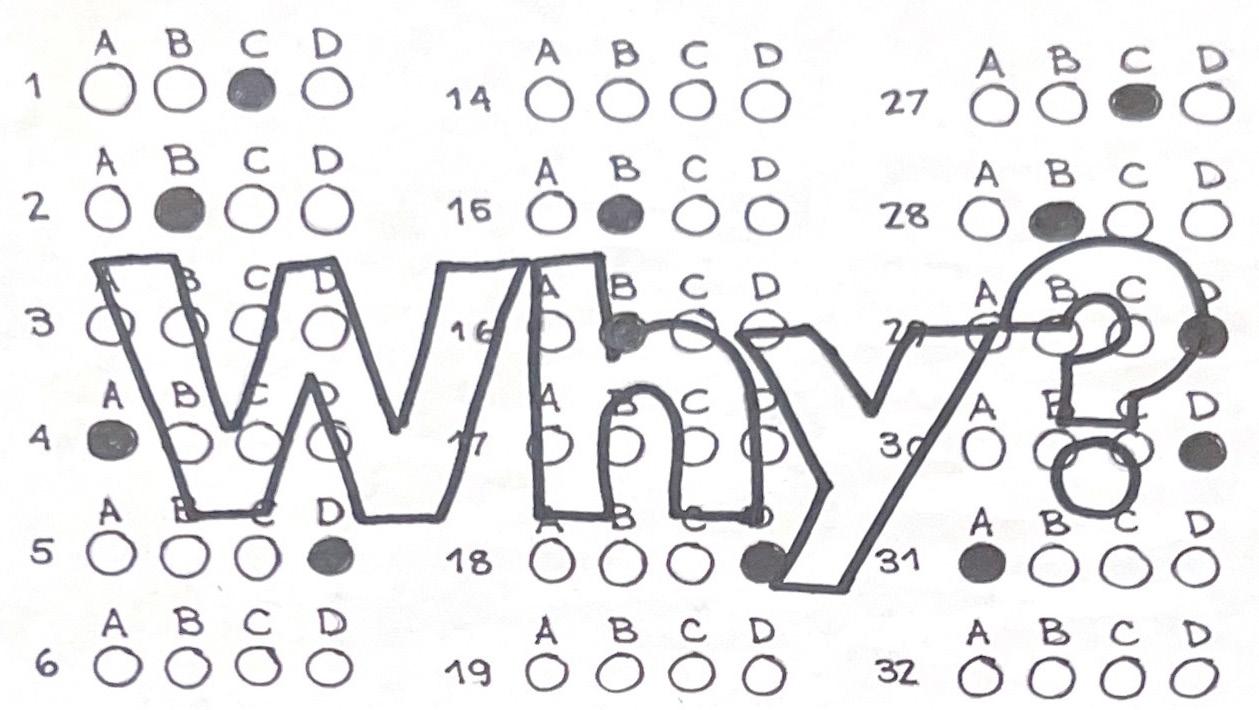
ty of California Davis this upcoming fall. While this is a school that still does require students to submit their scores, even if they did not, Mendoza had always planned on taking the SAT either way. “My parents from a really young age stressed the fact that the SATs were kind of like a gateway to getting into a good college or just any col lege in general.”
This however, is not the only factor that Mendoza believes makes him stand out for
but a good SAT score cannot make up for bad grades.” With Howland’s good grades on hand, she will be attending Smith Col lege, a school she applied to without sub mitting her SAT scores, and she was accept ed with her early decision application.
So, then why put in all the work to study? That’s what Ben Mongomerty (‘22) was wondering after he took the SAT test three times and received a final score of 1520. Even with this near perfect score, Mont
na Muppala’s article “Rejected” for how this has affected the Class of 2022. Machanoff may have an answer to this. “I think there’s a perception that because Covid happened, more people apply to a school that maybe they wouldn’t have before.”

Machanoff then continues on about what those high levels of applications could mean for students, causing some hard rejections. “If you look at those upper-tier schools and try to gauge the system like, ‘how do I get
other applicants…or even something that was a major factor during his application process. “I think that one of the really big myths that surrounds the college applica tion process is that the SATs is the biggest factor in a college application.” Mendoza then follows by saying how he, himself, felt his score was on the lower side compared to the average score for the schools he ap plied to.
Even if Mendoza still used the score, some chose not to utilize them at all. Al lison Howland (‘22), was so ready for her SATs and optimistic about the score she was going to get. She had always thought of herself as someone who would spend months on end preparing…that was not necessarily the case. “I was so unprepared going into it, then I got the mindset that the SAT was stupid and that was a little bit be cause I didn’t care about it, but also I was researching a lot about college and I found out that the main colleges I was applying to were test-optional.”
Luckily, according to Howland, “good grades can make up for a bad SAT score,
gomery was still accepted into very few of the competitive schools he applied to, waitlisted or even rejected from majority. Contemplating on this, he thinks he knows why: “I think I spent a lot of time studying for [the SATs] and instead of doing that, I could have participated in more extracur ricular activities or worked on my essays.”
This is something that may help Marthouse stand out from other applicants when she begins the application process fall of 2022. “I have engaged in a lot of extra curricular activities, including yearbook, as well as my photography.” Marthouse also touched on how her grades will hopefully aid her as well.
Mendoza also backs up this point. “I feel like the most important thing that colleges like to look at are their extracurriculars… They don’t want students who are going to study all the time, they want students who are going to make their community better, as well as the college they are going to bet ter.”
With this test score option, students are still feeling the sting of rejection. See Bhava
in, it’s so competitive.’ If everyone is doing that, then that increases the number of ap plicants and decreases the acceptance rate.”
The majority of the Class of 2022 has now decided where they are going to go to school if they are going to go at all. This leaves the Class of 2023 with soon having to go through this same process, with the exception of some schools beginning to yet again require the submission of SAT scores. As one of those juniors, having to potentially submit my SAT scores is scary. I did not necessarily do poorly, but it’s still nerve-wracking to someone who is not an exceptional test taker and could be denied from schools I would get into if I did not have to submit my scores.
However, with the knowledge I have learned, I feel confident that I will be able to rely on my extracurriculars that I have built over the years. I think it’s important to remember that an SAT score will not define your future. Those Princeton Review ads on Youtube always say, “the only thing the SATs test you on is mastering the SATs.”

 - Tess Brown
- Tess Brown
“Good grades can make up for a bad SAT score, but a good SAT score cannot make up for bad grades.”
Have you ever thought about going to therapy? Or do you already go to therapy? There are so many physiological benefits to having a therapist. Everyone, specifical ly teens, should have an unbiased, helpful person to go to and talk about the stress of living life. As humans, it’s natural that we look at things like therapy and don’t want to try it out, even if we know we are suffering or having a hard time, because of stereotypes, and stigma in our heads and look past and forget about the benefits that can help us.
Let’s start by listing some of the benefits most people know about therapy. Therapy is advertised that if you go, you’ll learn to be happier and to relieve yourself from de pression, anxiety, trauma, and emotions such as anger, stress, or sadness. These can all be true sometimes, but what else can we get out of therapy? Clinical Psychologist, Dr. Chris Chance has many techniques and knowledge about how peo ple can see better versions of themselves, de-stress, and shift our mindsets. “I find often people are surprised at how much they can improve their lives just by making some simple shifts in how they take care of themselves emotionally,” she said. For example, Dr. Chance says that, “perhaps choose to shame [yourself] less [and] to adopt a gentler voice when we make a mistake, so instead of scolding ourselves, we create a ‘best friend on our shoulder’ to say encouraging things and let that voice guide us instead of criticism and negativity.” Taking this advice and making these few changes in your life can help dramatically.
Heather Clegg (‘22) elaborates on the fact that “[therapy has] helped me better manage my emotions in day-to-day life. If something traumatic happens, I go and learn how to man age my reaction to it. Going to therapy has helped me gain a better perspective on how I can handle things in my life.”
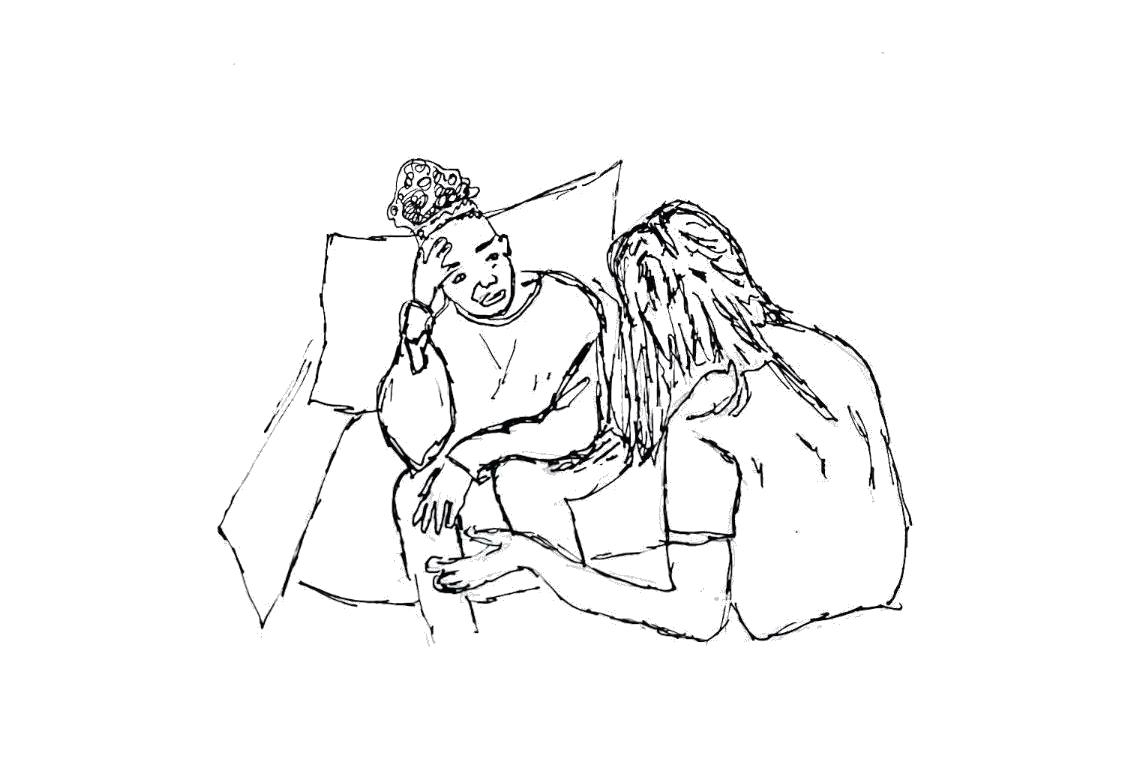
From the fifth graders in middle school, to the seniors in high school, all the way up to the senior citizens, everyone experiences stress in all sorts of ways. One of the best ways to deal with our stress is to talk about it, make a plan, and move through it with support, not all alone. Clegg explains how in recent life events, such as getting back to school, senior year starting, applying to college, etc. that “[my therapist] was able to help me with better time management and seeing how I
could better support myself and my stress.” Clegg, along with so many others experienced that neverending stress and felt like she just had no way to escape from the workload that daunts her and just builds every day.
Even if you aren’t experiencing the emotions mentioned before, it can still be beneficial. According to Dr. Chance, “psychotherapy helps a lot of people increase self-awareness and often people go to psychotherapy and see a psychother apist once they have a lot of symptoms. I wish people would be aware that you don’t have to have to wait to see those in teremotional patterns or things to get in your way of being able to be calm and mindful with decision making. In gen eral, awareness of our strengths, weaknesses, and challeng es can really help us have a smoother, more resilient path in life.” Making ourselves aware of mindfulness and talking with someone about the emotions we are going through can really help us self-reflect and look inward, which isn’t something we always have the opportunity to do in our daily lives.
What Justin Partis (‘23) has taken away from his time with his therapist is that, “you learn ways to destress about things going on in our life, but you also learn about yourself in the process. You learn how your brain works, how to manage things that you are experiencing, and you learn to see your self clearer in life by using the skills from therapy.” Therapy can help with not only stress, but as Partis explains, learning about yourself and how you work, so when moving forward you know what to do to calm yourself and make better deci sions.
We all know what that stigma of “going to therapy” is. Gen erally, when someone says they go to therapy, we think that they have trauma, anxiety, or depression. We think they’re un stable or don’t have their life together, when in reality, people are going for many reasons, as was just mentioned above. This
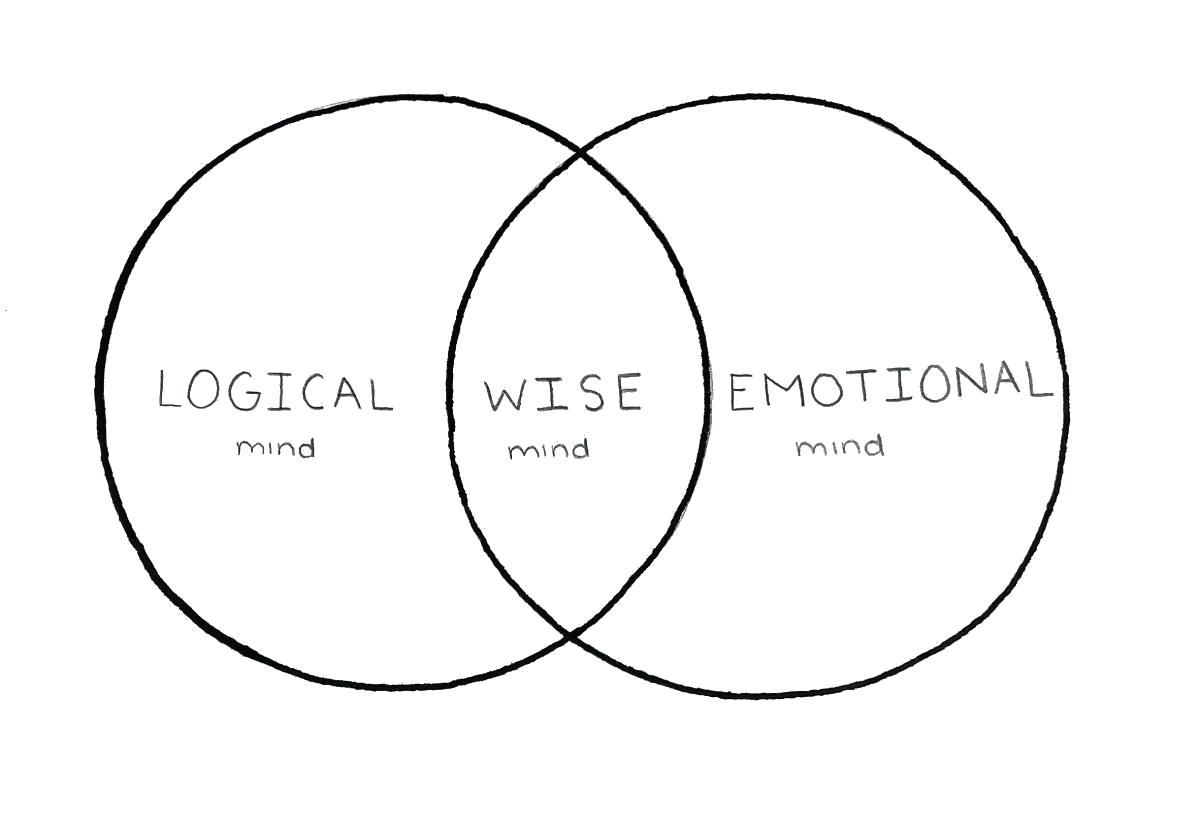
life and stay less stressed about things.” Partis has been able to take the stigma of therapy and throw it away and he has learned many ways to help himself. “The stigma sucks and you think people will care, but you move past it because in the long run you’re only helping yourself,” Partis added.
stigma can then be scary and can make people look away from therapy. Dr. Chance explains that “I think part of the ‘stigma’ of seeking mental health support exists because of this false di chotomy that people who go to therapy are ‘mentally ill,’ and people who don’t are ‘metally healthy.’” For a lot of people, we understand that it’s okay to seek help, but there’s always that voice in the back of our heads that tells us not to go because we fear what society will think of us.

Partis has been going to therapy for a few years on and off. Through this, he says that he has been able to “learn how to use tactics not only to benefit yourself at the time, but use them later in
So, let’s recap. When we move past the stigma of “going to therapy” and we seek help on things in our lives, we can have great benefits. “I think everyone needs therapy. I consid er myself a pretty mentally stable person, I’m not a wreck or anything, and I still think people who are “mentally stable” or “normal” should go to therapy because everyone can benefit from it, even if you don’t think you need it. It’s helpful and helps you gain introspective,” said Clegg.
“Psychotherapy helps a lot of people increase self-awareness and often people go to psychotherapy and see a psychotherapist once they have a lot of symptoms.”
- Jen Newick ArtworkbyHannahMuessig
Throughout all of my schooling, the number one thing that I’ve been told by my teachers is to avoid procrastinating. It seems log ical and simple to just break up time to work on assignments and not get distracted during those time blocks, especially if it means good grades and decreased stress, right? This has been my mindset every day after school, but somehow my after school “work ses sions” keep getting pushed to 9, 10, 11 pm and sometimes into the morning hours.
I’m only a small part of the Oyster River High School pro crastination community. In a survey on MOR’s Instagram, 92% of 235 contributors reported that they identified as procrastina tors. With stress from time consuming and challenging tasks, sometimes students, like myself, are thoughtless ly drawn to instant pleasures that are both easy and fun like social media, video games or even easier, less timely assign ments. Although easy and fun things are needed sometimes for mental breaks, these things often cause more stress than relief if carried out too long. I believe it would be beneficial to learn how to stop yourself in your tracks and just start assignments. In this article I talk about how procrastina tion can impact lives at Oyster River and methods to gain fo cus and try to limit procrastination habits in the future. There’s not one way to do this, so hopefully this article will give you ideas of what could work for you and give you a balance of pushing yourself through hard activities while also having meaningful breaks.

In a Ted Talk titled “Inside the Mind of a Procrastinator,” writ er, blogger and procrastinator Tim Urban reflects on why people procrastinate despite its consequences, and this inspires some of my ideas. He believes procrastination is ingrained in our animal survival. Animals try to avoid difficult tasks unless so panicked and stressed that the task seems a matter of survival. He said, “if you’re a dog and you spend your life doing nothing other than easy and fun things, you’re a huge success!” However, he also added that we live in a complicated society where these instincts don’t make as much sense as they do in the wild. In our society, doing hard tasks at times with less stress can be crucial for success.
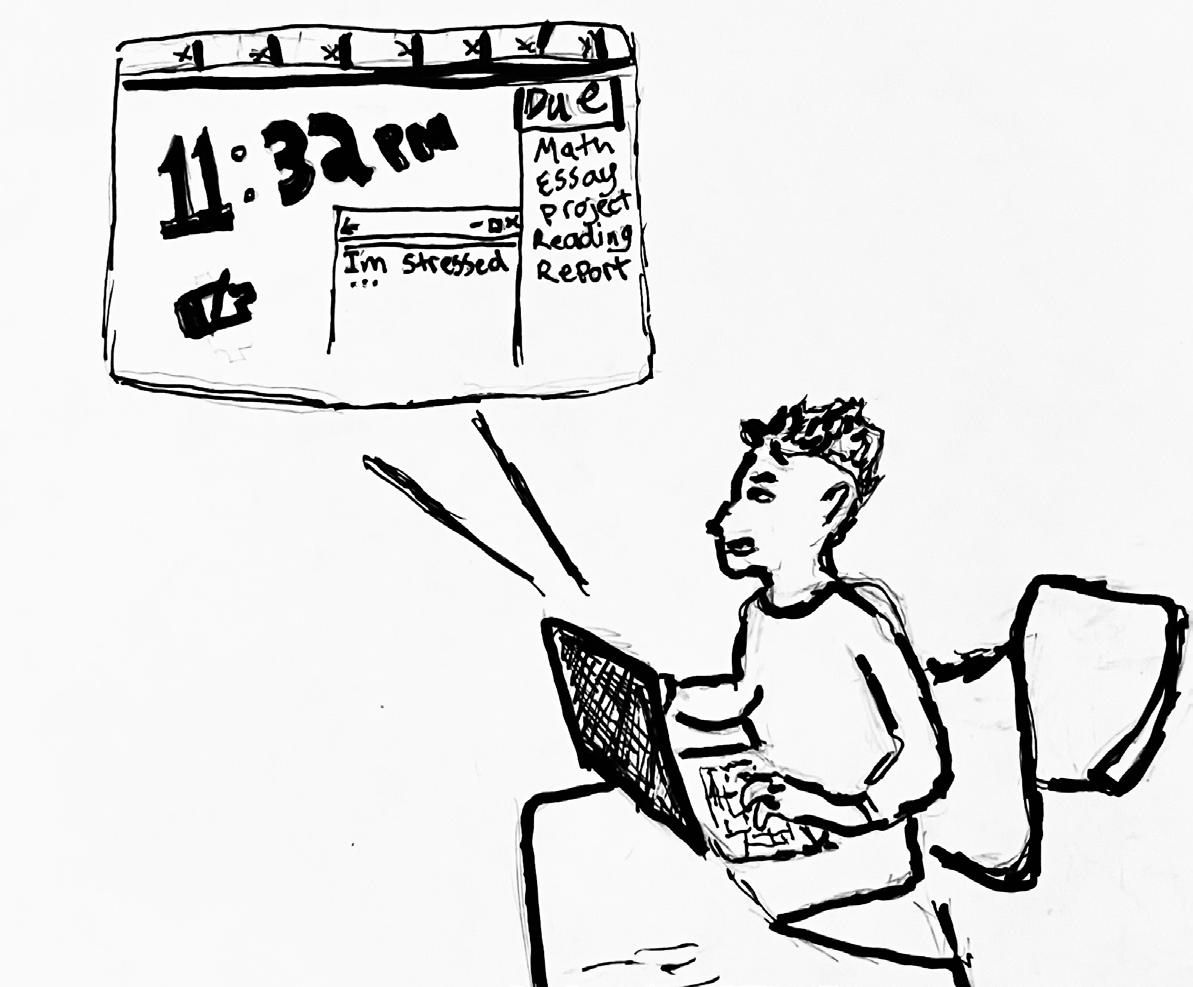
Allison Howland (‘22), who even happened to be procrastinat ing a lab report while I interviewed her, seemed to have a similar experience in her procrastination. Sometimes she waits so long that the assignment triggers a panic that gets Howland into a deep focus. She shares, “procrastinating just makes [the assignment] more stressful. Sometimes I can work off that stress. Sometimes when I’m really stressed out about something, I work best under that pressure and I’m like ‘I have to do this.’ Then my entire life is just that lab report for a day.”
Although sometimes working under panic gets the job done, teachers at Oyster River real ly try to train their students not to do work that way. They do this through breaking up blocks of time, purposely giv ing large projects that take extended periods of time to complete and sometimes giv ing verbal reminders like “if you save this all for Sunday night, this is not going to be fun.”
The reason why teachers give this training is because there are a lot of things at school that are either skills or knowledge that take lon ger periods of time to truly get a hang of. Grade power learning, a website that assists student learning, explains that research shows cramming knowledge can be one of the least effective things students can do for many reasons, such as only having short term memory of the information, taking away sleep time, not fully understanding, and not focusing well under the stress. That is why learning for math tests or writing a well-written paper takes time.
Addison Daniels (‘20) a music education major at University of Miami, explains that he has and does procrastinate many things. There are just some assignments that he successfully does with a time cram. However, he emphasized that this isn’t something that works well for learning music. He believes if you are looking to learn a skill or get in-depth understanding, that often requires daily effort. Daniels has made playing music a daily habit that he loves and because of that he has been successful in his performances.
Not only does working on a skill over longer periods of time prove to help give skills, in the community there are many oppor
tunities for cool experiences and improvement if students don’t procrastinate. Johnson and Howland mentioned that they missed opportunities like writing labs, asking a friend how to do some thing, hanging out with friends, or doing an activity that they wanted to do because of doing something last minute. Missing these opportunities can be disappointing and feel like a waste of re sources. I’ve had times where I’ve crammed my projects too much to get editing help or to work on the polishing. When I don’t get that help it’s not automatically bad work but I always notice a leap in quality and pride in my work when I get lots of feedback and spend lots of time on something.
Breaking up time really has its benefits as stated above, manag ing time can be a challenge, even for adults. Science teacher Na than Oxnard is someone who used to procrastinate in high school, college, and sometimes now. He understands that students might want to be doing things other than his assignments because there are lots of choices throughout the day. He believes that the most im portant thing is finding a balance in your life between doing hard work and also things that recharge you like spending time with your family. Being an adult, Oxnard has had to learn how to balance having a family and a job and believes that learning to prioritize time is crucial.
With keeping a balance in mind, it’s a great thing to fit some time blocks in your life where you do things that aren’t super hard and productive. A lot of the things I go to when I don’t want to do work are things I really enjoy, and they are only bad when I spend way too much time doing them or am so stressed out about what I should be doing that I don’t enjoy them.
One way that I have been trying to keep a balance is through asking my self if I really need a break or if the assignment is just something I just don’t want to do because it’s stress ful and time consuming. When my brain is tired and I’ve done a lot of work that day it can be super ben eficial to me and my work to do something like go on a walk, spend time with a friend, or play with a dog. These things can really help recharge if they are kept to a certain amount of time.
Although fun, these things can also take away from focus some times, so it’s important to be cautious of how much time is going by and be selective of choosing breaks that you know will allow your brain to get back in the zone after. For me, I know that electronics often have too many distractions and, rather than give me the en ergy to focus, they just clutter my mind and sometimes make me stressed about even more things. In that way, it’s important to find breaks that you know will really decrease stress and make getting back to work easier.
When it’s a time that you just don’t want to do work that you should be doing, some students and I have some strategies to go about that. One big thing is to just make a plan on when you are going to complete things and break the assignments into specific

steps. That way it’s often less stressful and on-task. Other students mentioned strategies like putting yourself in a productive work space, breaking up time with 5-minute breaks, dressing up nice, working with friends, or pretending that this task has more weight than it really does at the moment. Sometimes the small tasks that need to be done over time just seem so minor but when they add up to a short period of time they aren’t as minor anymore. Splitting in in smaller chunks allows for better ability to focus and make each part of completing a project have more quality. Some of these strategies are helpful for some students but not others. It’s import ant to find what works for you and reward yourself with longer breaks that are meaningful to you when you complete your work.
Like Daniels with his saxophone, making the work something you love doing can really help you find a balance in life and also decrease procrastination cause it’s something you look forward to generally. In the future, Will Johnson (‘22) hopes to fill his day with more things he really cares about. He thinks this will definitely make him put things off less.
With that in mind, it’s also im portant to find a balance between doing and recovery. As a senior in highschool, one thing I would change in my experiences is say ing yes to lots of opportunities and instead picking ones I know I will really enjoy and learning more from them. With so many opportunities in highschool that seem exciting, it can be easy to fill up too much. When I fill up too much, other parts of my life that need attention get put aside and the things on my plate lose some of their value. When this happens there’s a tremendous amount of stress that can cause things to be put off - both the things I signed up for that are causing stress and also the things I’m sad I’m miss ing out on Overdoing certain as pects of your life, can make valu able things in your life lose some of their value to you and actually cause less productivity.
We all make procrastination mistakes and lose our balance sometimes. Through mistakes, stress, successes and unforgettable moments from hard work in high school, I’ve learned to look at the big scale of things and bal ance life even if it means working on some other important thing closer to the deadline. Procrastination isn’t just about doing work with deadlines because there are many important aspects of our lives that don’t have a deadline that need attention too. For that reason, I believe it’s ok to push back assignments or some commit ments sometimes, although I try not to. What matters most is the habits made over time and finding a balance in your life between hard and easy things. Hopefully the advice above can help some of us push ourselves during times of challenge and also remember that the things on our checklists aren’t the only things that matter.
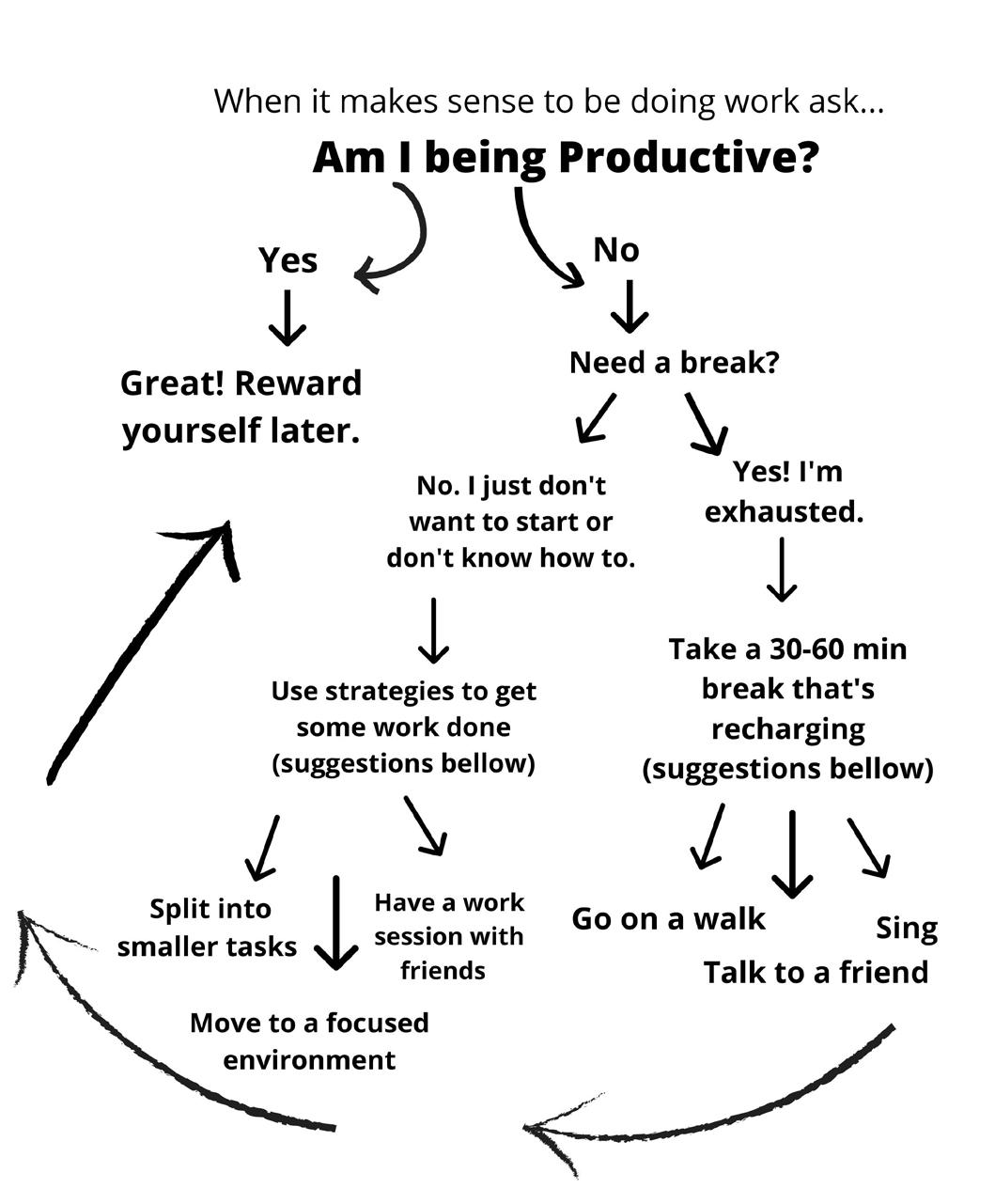 - Hannah Muessig
- Hannah Muessig
From: Mr Fox <Commercial@mrfoxcomposting.com>
Sent: Tuesday, April 12, 2022 9:34 AM
Subject: Mr. Fox Contamination- Oyster River Middle and High School Hi,
I hope this finds you well and your week is off to a good start! We wanted to reach out as we have noticed significant con tamination at Oyster River Middle and High School lately. Can you help us out with this?
Thank you!
Commercial Accounts
Mr. Fox Composting Operations Coordinator www.mrfoxcomposting.com
On Wednesday April 14, 2022, I was for warded this email from Sustainability club advisor, Jon Bromley. It was a chain of back and forth communication between Brom ley and a representative from Mr. Fox. I opened this email, almost expecting it to be a shout out from Mr. Fox for all the hard work and effort Oyster River had put into our new composting system, praising the dramatic decrease of contamination in our compost. As the chain of emails loaded, my mouth dropped as I saw five attached pic tures at the bottom of the email. The pic tures were of Oyster River compost bags, severely contaminated with plastics, chip bags, paper, and piles of non-compostable items. The email from Mr. Fox blatantly stated, “we wanted to reach out as we have noticed significant contamination at Oys ter River Middle and High School lately, can you help us out?” Reading this chain of emails and staring at these pictures of completely contaminated compost bags, I felt embarrassed to be an Oyster River stu dent and disappointed in my peers. Only a
few years ago Oyster River was in jeopardy of being removed as a client of Mr. Fox due to high contamination levels, and we can not let this happen again.
Oyster River uses Mr. Fox, a local indus trial composting plant that picks up our or ganic waste every week so we can compost. Mr. Fox is based in York, Maine and picks up compost from businesses and houses all over the Seacoast. Mr. Fox makes com posting easy and attainable for Seacoast families and businesses. They provide bags, bins, instructional signage and even have representatives that will come to your business and train you on how to com post. Mr. Fox even delivers soil that they produce from compost to their customers, so we can continue to grow vegetables and fertilize our gardens. Composting, if done correctly, is the only kind of waste disposal that has zero effect on climate change. An article by the United States Environmental Protection Agency organic waste, when disposed of in landfills creates excess meth ane and carbon dioxide that can be easily avoided by composting, it also reduces the need for chemical fertilizers in our gardens and compost provides carbon sequestra tion (the process of capturing and storing atmospheric carbon dioxide. (USGS))
The interest and need for a new compost ing system and behavioral change was dis covered when the Sustainability Club and Environmental Science classes performed an organic waste audit in late 2019 to ear ly 2020. We spent our lunches and free periods sorting through trash, recycling, and composting bins, weighing them and carefully recording our data. We discov ered that Oyster River students are creating
over 7,000 pounds of organic waste and throwing it in the wrong bins. Over 7,000 pounds: the weight of a Hippopotamus, the weight of about seven average sized cows or seven grand pianos.
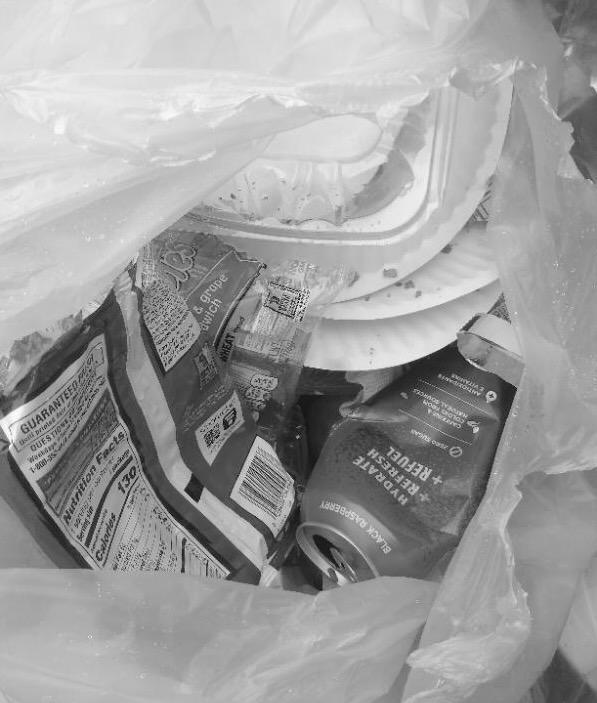

When Nori Sandin (‘23), an active member of Sustainability Club, received the email from Bromley, she said, “I was in
horror over the fact that this doesn’t feel so much like an educational issue anymore. It feels like an issue of ignorance coming from the student body.” Sandin contin ued, “I think that a lot of students don’t understand the gravity of the situation, and the fact that this [climate change] is a time-sensitive situation.”
Just over 4,000 of these pounds are com ing directly from classrooms, leaving the other 3,000 pounds to be from the cafete ria. So, the Sustainability Club went to work developing a project called “The Compost System Design.” The Sustainability Club carefully mapped out each section of the school into ‘zones’ organizing classrooms by departments and location. We tried put ting a compost bin in each of these ‘zones,’ each carefully labeled in big bold letters ‘COMPOST ONLY.’ But not so surprisingly, the bins would be filled with maybe a single
banana peel, but covered with coffee cups, snack bags, and plastic water bottles by the time they were collected. Oyster River students have time and time again proven to the Sustainability Club, to the staff, and to administrators that we are incapable of caring enough about how we dispose of our waste.
Grace Webb (‘23) and Laura Slama (‘22), two members of Sustainability Club, have spent the last two years leading the club in composting efforts. Webb and Slama have lead workshops with community members and given presentations to Oyster River staff about the importance of composting. Webb composting directs food waste out of a landfill or an incinerator and into nutri ents that can be directed back towards the soil. It’s a full circle path that food waste goes on.” Webb continued to explain the importance of composting, saying that the process eliminates the production of excess methane or carbon dioxide that you get from landfills and incinerators. Webb and Slama have spent hours making presenta tions and workshops for our town, and our teachers at Oyster River, and they are hop ing that in the coming years, they will have the chance to present to fellow students to explain the necessity and importance of composting in the school.
Oyster River is overflowing with straight-A students, scholar athletes and conscious people, but there seems to be a lack of understanding and disconnection when it comes to making sustainable choic es. Sustainability club has narrowed the root of this issue down to; lack of knowledge, lack of understanding the importance, be ing overwhelmed or having climate anxiety and the lack of convenience. Oyster River students seem to be ignorant of the positive effects of composting, and have careless be
havior when it comes to disposing of their waste. In middle school, a teacher would stand next to the trash receptacle, help ing students properly sort and dispose of what was left on their lunch trays, which made sense because middle schoolers are between the ages of eleven and thirteen. It works fairly effectively. Sometimes the idea of having lunch monitors to help with waste disposal comes up, and it always makes me sigh. In all honesty, high schoolers should be able to tell the difference between the words ‘COMPOST’ ‘LANDFILL’ and ‘RE CYCLING’ at this point in their education. The labeled signs, with examples and lists of what items belong in what bin are still not easy enough to understand for the majority of the Oyster River student body. At one point, our cafeteria invested in using metal utensils instead of plastics, in an effort to be more sustainable, but lunch monitors and janitorial staff soon found that the metal silverware was being thrown into the trash bins and getting sent to be incinerated.
I have been a member of the Oyster Riv er Sustainability Club for all four years of my highschool career. Each year, we have spent countless hours trying to solve the seemingly impossible task of teaching stu dents and staff about sustainability. I have worked with amazing, passionate students and teachers who are always willing to step up and work hard to change the behavior of Oyster River students. Through COVID-19 and remote learning, the Sustainability Club met consistently and planned an en tirely new design for our composting sys tem so that teachers and their classrooms could have an efficient and effective way to dispose of organic waste.
Sustainability Club meets at 7:15am on Tuesday mornings and we all trudge in ex hausted and frustrated. Every week we are there, ready to pick apart this composting catastrophe and figure out plans, goals, and sustainable solutions for my peers and teachers, so we can make sustainability easy, convenient, and create a progressive school environment that acknowledges the climate crisis and is doing our part to save our planet, our community, and cre ate a new normal for those who come after us. Ultimately, it’s up to students at Oyster River High School to do their part or we will never be able to take steps forward to make our community more sustainable. It depends on more than just the actions of students who choose to be involved in clubs that advocate for sustainability. Movement and progress rely on students standing up,
moving past the inconvenience and extra effort, and the ability to look forward for the ultimate payoff of carrying out these small actions.

We are being faced with an issue of chronic carelessness. We have signs, labels on bins, even teachers helping sort trash. But for some reason students fail to make the connection that plastic goes to the land fill or recycling, and organic waste goes to the compost.


So are Oyster River students just lazy and not paying attention when they are disposing of waste? Or do they simply not know the difference between compost and landfill? Sustainability Club has made it our responsibility to educate our peers on why making green choices is important. But
time and time again, they have shown us that they won’t listen. The composting ca tastrophe at Oyster River is simply a cultur al and behavioral issue that needs address ing from more than just a sustainability club. Our administration and school board need to step in and create policy that makes basic environmental science a part of our curriculum, and put more effort into cre ating concrete learning experiences for our student body that will help them be good Earth citizens. But for now, the best thing we can all do is care a little more, think be fore we act, and remember that all the small actions add to the foreboding climate crisis. We need to take action.
- Evy AshburnerYoucanhardlyhearthemusicblaringfromthespeakersasitisslowlyreplacedwiththetur bulentrhythmofsneakerssqueakingonthegymfloorandthebarbaricvoicesofMr.Bobcatand seniorclass.Theremaininggradespacktightlyintothebleachersandfacethewall,fightingthe urgetoturnandfacethecommotionandchaosbehindthem.
I can say with certainty that the highlights of my freshman and sophomore years were the memories I made with friends at some of Oyster River High School’s most anticipated events and tradi tions. I remember being infatuated with the Bobcat pride and pas sion that the class of 2019 and 2020 seemed to bleed, and it made me excited to participate in every opportunity to show my own school spirit. Typically, this is how it works: Underclassmen learn the high school traditions by observing the upper classmen. However, after COVID-19 sealed us out of the building for several years, the class of 2022 are the only current students who have had the opportu nity to experience an entire year of normal traditions in the high school. What even are the traditions that I’m talking about and why is it important to continue and preserve them?
In a typical year, Oyster River High School sponsors events including Mr. Bob cat, The Hypnotist Show, Besties Baes & Bros, Spirit Week, Pep Rally, Prom, and Senior Week. Seniors enjoy the luxury of the Senior Core and many students attend rowdy sports games geared up in their Super fans shirts. Superfans are typically vocal students that attend many, if not all, of the Oyster River athletic games. Though not affiliated with the school, seniors have the privilege to participate in class-exclusive activities such as Senior Skip Day, Senior Prank Day, and Senior Assassin.

With so many traditions, preserving them involves the under classmen participating so that they know how to continue them going forward. Many seniors feel that the energy and excitement about traditions are starting to fade and want to bring it back. Jayson Blaisdell (‘22), a Superfan, said that some of the Bobcat
pride “was lost over Covid and it’s on [seniors] because we were [in the building as] freshmen and sophomores. We saw what those seniors did then and we’re trying to replicate that now knowing that we’re going to be leaving next year.”
Reviving that school spirit can be done through continuing our traditions at the high school. One of the many reasons why traditions are beneficial to the high school is that they can bring the classes together and provide a sense of unity in the community. Sam Haskell (‘22), Class of 2022’s Mr. Bobcat, said that “after Covid happened, a lot of people started to break apart, but school tradi tions bring all the different grades together.”
The friendly competition involved in the traditions at the high school are one of their biggest draws. Costas Frangos (‘24), who participated in Besties Baes & Bros with his sister Lexie Frangos (‘23), did so because “I thought I was going to win and I also wanted to beat Mr. Baver.” There is an element of friendly competition in many of the events, espe cially in Mr. Bobcat and the Pep Rally.
In addition to bringing the student body togeth er, our traditions make us unique and cultivate a culture of togetherness at the high school. “The big tradition that I like is that there’s no other high school I've seen that has fan t-shirts. The Superfan environment at Oyster River is different than I’ve seen at any other school,” said Blaisdell. As a student from Barrington Middle School, he said that a significant reason why he chose to go to Oyster River High School is because of this community culture. “I liked how even though it was a bunch of different towns, we grouped together and were a big unit when it came to sports and
competition against other schools. I really like that and I hope that we can hold onto that after we graduate,” he said.
When I was a freshman, I went to every event and participated in every tradition. I looked up to the upperclassmen and couldn’t wait until I, too, could be a part of Senior Assassin and go to Prom. Having traditions gives students something to look forward to as they move through high school. Frangos said that he heard about many of the traditions from his older sister when he was in eighth grade which made him excited for high school. The importance of continuing traditions goes further than just the enjoyment of current high schoolers.
This is not to say that the

traditions won’t ever change. Alexander Eustace (‘14), English and acting teacher, said that “Besties Baes & Bros” used to be called “Friends and Benefits,” and staff were more involved in traditions at the high school than they are currently. “Staff competed. During all of the activities, staff were part of the events. They are no longer part of that, which is disappoint ing for me as a staff [member],” he said.
As for preserving the traditions that we have, it’s historically been on the shoulders of upperclassmen to model the traditions at the high school. As the cur rent senior class graduates, the baton will be passed to the Class of 2023 to show the underclassmen how they can show their Bobcat pride.
An ironic beauty pagent / talent show where seniors participate in activities with the goal of being crowned Mr. Bobcat.
A school-sponsored event where students may partcipate in activities led by a hypnotist.
A competition between best friends, couples, and siblings to see which group knows each other the most.
A week leading up to the Fall Pep Rally where students dress accordingly to different themes to show their school spirit.
A whole-school competition where students from each grade compete in activities such as tug of war, three-legged race, and knockout; led by Mr. Bobcat.
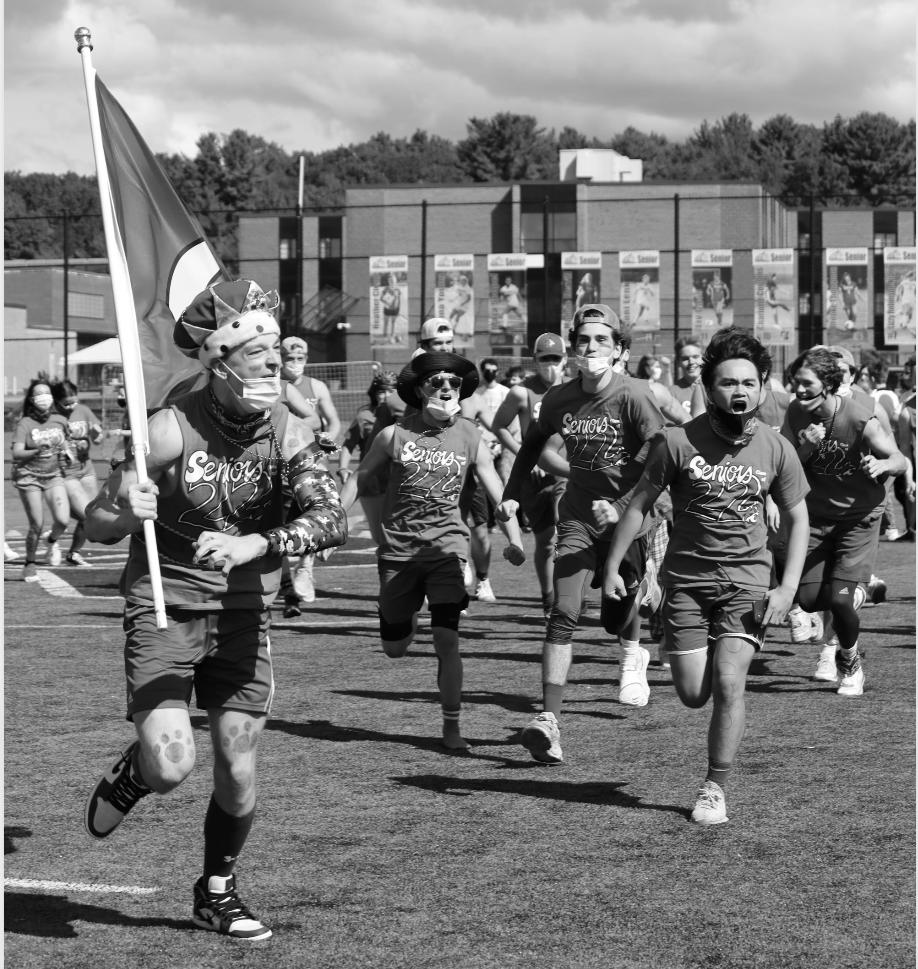
A traditional formal dance for the junior and senior class.
A day in the spring where seniors collectively skip school to bond with their class.
A day where seniors set up pranks throughout the school for students and teachers.
An activity for seniors that involves assassinating assigned targets with water guns.
The week leading up to graduation where seniors may participate in various activi ties including the senior trip.
Vocal students that attend many, if not all, of the Oyster River athletic games.
A hang-out location in the high school designated for seniors.
Many times our strongest friendships can come from playing sports. Taking a sibling relationship and adding in the competition and commitment of sports help make it even stronger.
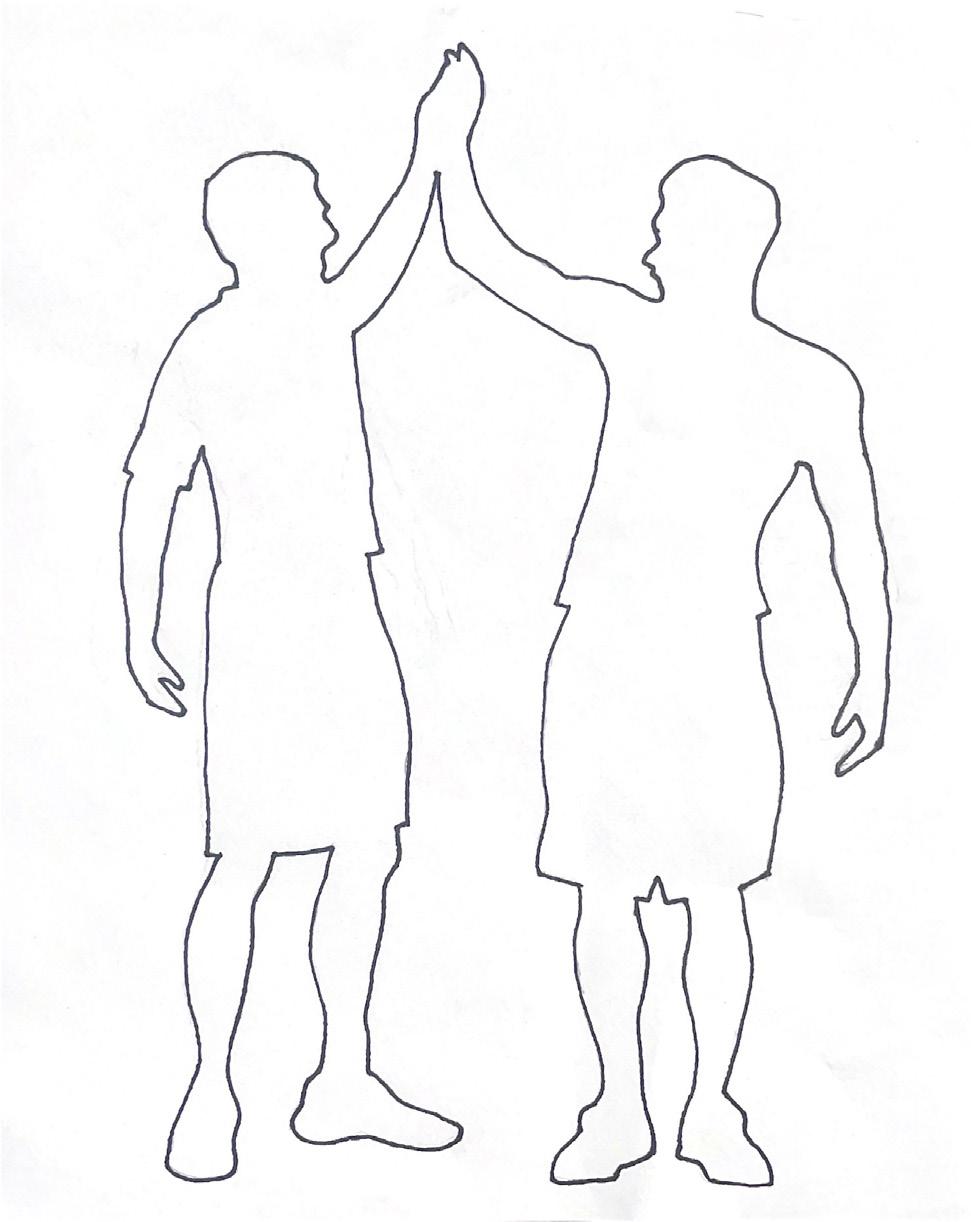
At Oyster River High School (ORHS), numerous students play sports with their sibling(s). Many have noticed that playing a sport together can help strengthen bonds and even friendships between them. With any sibling relationship, there can sometimes be fighting or competition, but that can also become motivation to do better or be better. Through the ups and downs of high school sports, having a sibling by your side can be a great experience.
On the varsity softball team at ORHS, twins Addy Veno (‘24) and Maddy Veno (‘24) play with their older sister Morgan Veno (‘22). The opportunity to play on the team with their older sister is some thing that they have really enjoyed over the past two years. They felt that it is a “once in a lifetime experience” which they are very lucky to have. They especially felt it after victories such as winning the NHIAA division II championships during the 2021 season.
This year, the girls varsity lacrosse team at ORHS also has three sets of sisters, all pairs of seniors and freshmen. This is very uncom mon. Girls lacrosse coach, Kirstin Lang, noticed this and shared the Venos’ sentiment. She said that the seniors getting to play with their freshmen sisters is “very rare and something that is probably a once in a lifetime [experience].”
Many siblings find it motivating to do better when they have their brother or sister with them. Ben Kelley (‘23) played basketball with his brother Aidan Kelley (‘21) for two years. Ben played JV his freshman and sophomore years, but was swung up to varsity each year and got to play alongside his brother. “[Aidan] was a really hard worker and kind of set an expectation. That was a lot of motivation to do better and work harder,” he said.
Micah Bessette (‘24) does track and cross country with his older brother Ethan Bessette (‘22). He said, “Ethan definitely motivates me because he is very determined and dedicated. He will keep trying through the pain [of running] and that definitely inspires me to try harder.”
Motivation to improve doesn’t always just come from watching a sibling though. Tess Pueschel (‘22) and Elsa Pueschel (‘25) are both on the varsity swim and lacrosse teams. Elsa shared how Tess yelling at her (with love) to get back in the water or finish a set really helps
her improve. Tess agreed and said “definitely during practice we push each other. Usually it’s kind of snarky but it gets the job done.”
Getting upset with each other or being “snarky” is a unique aspect to a sibling relationship. It’s normal and “it’s how siblings act,” said Garrett Quaglieri (‘22). He and his twin, Kenton Quaglieri (‘22), have been playing soccer, hockey, and baseball together all four years of high school.
Lang said that from a coach’s perspective, having siblings on a team “brings out good competition [and] a fun aspect and atmo sphere.”
Micah also mentioned competition between him and his brother, especially in cross country. Since running is based on time, it is easy for them to compare. He said, “we inspire each other to do better and go faster. It seems like there’s always [something] to strive for.”

The sibling relationships are not only fun to watch, as Lang noted, but can also be very beneficial to team dynamic. Morgan said, “I feel like getting their input from the younger side of things is really important. I think it definitely helps me be a better leader.”
For many players such as the Kelleys, the Pueschels, and the Ve nos, they all have different and almost opposite roles on the team. Many, like Tess, felt that having that space was good. She said, “I feel like I would probably yell at her a lot more if we did have to play on the same side of the field. In that sense we’re still working together, but we’re not clashing.”
Ben shared how playing opposite roles benefited the team. Ben plays post and Aidan was point guard on the basketball team, so Ben being able to know when he would pass and where, “kind of helped me and him to get assists and put ourselves in a smart position.”

For the Quaglieri twins, things are a little different. They play on the same line in hockey, both play outfield in baseball, and in soc cer Kenton is goalie, while Garrett plays defense: all very similar, if not the same, roles. Kenton shared that playing the same position in hockey can lead to some competition, but they haven’t really experi enced it in soccer or baseball. They have fought on the ice before in hockey, but they also defend each other. “In hockey one time [Gar rett] got hit, so I went up behind the person and [just] threw them,” said Kenton.
Whether it’s making friends easier, being motivated to improve, or just knowing that someone is always there for you, playing a sport with your sibling can be a great experience. Tess reflected on this being her last year of sports at ORHS and said, “I’m happy to share it with [my sister].”
- Libby Davidson



